For nearly a decade my trainer recommendations guide has been a staple of this time of year, consolidating all the latest trainers into the do and don’t buy list to consider before spending some hard-earned cash to then suffer inside. But this year is different.
The simple reality is that finding in-stock trainers is near impossible in many regions of the world. Especially the more popular models, or rather, the ones you actually want to buy. So in some ways, the recommendations guide this year could read: Buy anything you can actually find.
Still, on the off-chance you do have some choice on what you buy – then this guide is here to help you pick the right trainer. Note that as one might expect there’s been very few trainer announcements this year, and those that have occurred have been incredibly minor updates. So the vast majority of this guide remains pretty similar to last year. Still, I have swept through and added or removed some trainers for various noted reasons, as well as retested trainers where applicable. I do not expect any further/new mainstream trainers until next summer.
Keep in mind this guide is essentially focused on smart trainers. Specifically ones that transmit some sort of ANT+ and Bluetooth Smart signal (dual/concurrently), and allow control of the trainer itself (via ANT+ FE-C and/or Bluetooth Smart FTMS). In other words: A company has to follow the well recognized standards to even be considered for this list.
Finally, for indoor bikes – I might do a separate shoot-out guide on those, if there’s interest. I have my guide from last year, though that was prior to the Stages Bike SB20 this past June and Wattbike ATOM 2020 a few weeks ago.
(Oh, and if you’re looking for my 2020 Cycling Smart Trainer Apps guide, you’ll find that from late this past spring here. There honestly hasn’t been a fundamental shift in apps since then, as most apps have been trying to keep up with the surge in their user base.)
How I Make Trainer Recommendations:
First and foremost, I only recommend trainers I’ve actually used. It’s simply hard to judge things like accuracy or total ride feel unless I’ve got a unit in-hand. And while one might think you can just look at a past similar trainer, my testing has shown that’s rarely the case (and in fact, we see very specific examples of that this year with the KICKR 2020 and ATOM 2020 being different in the accuracy realms).
When I look at recommendations across all products I make, I try and recommend products to you in the same way that I’d do to friends and family. I keep it simple and explain exactly why I feel a given way.
My goal is NOT to make a roundup of every trainer on the market.
Though I will briefly discuss why I didn’t include some trainers in this piece at the end. This is, again, my *recommendations*, not the holy grail of everything ever made by everyone. Still, I’m lucky enough to have been able to try almost everything made by all the major trainer companies this year, at least at the mid to upper end (I don’t tend to review the 342 different models of trainers from $75 to $200).
Price Ranges & Currencies:
Over the last few years we’ve continued to see major shifting in price vs feature-set combinations. For example, functionality and accuracy that used to be reserved for $1,200 trainers has slid down to $900 trainers and even $700 trainers. I had to change my price bucketing last year to account for this (again). My purpose isn’t so much moving the goalposts, as it is making the groupings more logical. Meaning, someone looking to spend $599 is probably OK spending $699, and someone teetering at $529 might be OK spending that $699 too if the benefits make sense.
Meanwhile, someone looking for a $599 trainer isn’t likely the same person as one looking at a $1,199 trainer. So, here’s the 2020 buckets, aligned to the trends of trainer pricing over the past year:
Budget – Sub-$450: Most of these (all of these?) are wheel-on trainers that have basic smart trainer functionality (including replicating climbs, setting specific wattages, and working with apps). However, they tend to be less powerful trainers and may not be as accurate or as realistic feeling.
Mid-Range $450-$700: These tend to be units that have everything of the price bucket below it, but usually with just a bit more accuracy and a bit more power. Often with that slightly better road feel.
Mid-High End $700-$975: This category exists because there’s a clear line in the sand between the flood of sub-$599 trainers, and the flotilla of $700-$800 trainers. I just don’t think it makes sense to put them in the lower-priced category, though the case could easily be made that they compete with the $1,000+ trainers (and are almost universally a better buy). The key difference here tends to be accuracy and road-feel, once again stepping it up a bit.
High-End $999+: These are the high-end trainers, and primarily distinguish themselves from the mid-range by increasing durability, reducing noise, increasing road-like feel, incline/wattage increases, or just being expensive for the heck of it (i.e., legacy branding/marketing). Still, the line is getting fuzzier and fuzzier here between a $900 trainer and a $1,199 trainer.
Now – you’ll notice the dollar signs, which in this case is implying US pricing. I call this out specifically because the whole pricing business is kinda wonky, especially in the differences between US and European markets. There are specific cases where something may have a price gap in one market (i.e., KICKR vs. NEO in the US), yet be nearly identical in other markets (some European countries). Similarly, the European markets generally get a better deal on European-made products (Tacx/Elite), while US consumers tend to get better pricing on US-made products (Wahoo). All of which ignores the reality of MAP (Minimum Advertised Pricing), which exists in the US and doesn’t exist in Europe.
Next, be wary of purchasing trainers outside your home country (meaning, if in the US, buying from a retailer in Europe). This is because if you have a problem, you’ll be on the hook to pay for shipping of the trainer back across the pond for service. As one who does that regularly, it’s @#$#@ expensive. If you don’t believe me, go and look at the older 2015 trainer recommendation post, and see the river of tears for folks who have had to deal with cross-Atlantic shipping of cheap trainers they bought when things went wrong. By all means, if you understand the risk – buy where it makes sense. But do understand it’s a very real risk.
And finally, note that I tend to focus on trainers that have some element of technology in them. It’s not that I think that all non-technology trainers are the same (cause they aren’t…well…except that most are), but it’s because that’s just what I happen to review the most here.
Things to Consider:
There’s a lot of things to look for in a trainer – but some are applicable across the board from a sub-$100 unit to a $1,500 unit.
First and foremost, it needs to be sturdy. The more plastic involved, the less likely it’s going to last over time – at least on vulnerable and load-bearing components/areas. Take for example, the old CompuTrainer, otherwise known as the rock. A tank really. I’m certain I could throw that in front of a semi-truck, and it’d probably be fine. As such, those units last 10-15 years (or more). In fact, I don’t know anyone who’s ever broken a CompuTrainer frame (ok, ignore the flywheel). Some electrical components eventually wear out, but the frame is astoundingly sturdy. I find the Wahoo KICKR in that same camp. It’s a beast component-wise. In many ways, the KICKR SNAP frame is the same way – as are the Kinetic frames too.
Inversely though, while the Tacx NEO series shell is made of plastic, directly under that layer is a metal frame. And nobody is kicking the side of their trainer randomly from that angle. Frankly, looking at anything on this list there’s no durability-type issues. The ‘worst’ durability type issue we’ve seen is the stickers (chevrons) on the back of the Wahoo KICKR/CORE trainers flying off the flywheel. Which I feel is almost a badge of honor that you put out that much wattage.
Second, look at the attachment point to your bike. I’ll start with the ones that leverage a skewer of some sort and don’t require removal of the wheel. In these cases, try to find one that has a ‘quick-release’ mechanism for quickly locking the trainer into place. One that doesn’t require you to endlessly spin the tightening lever and try to find an exact spot each time. See below for an example of a quick-release lever on the mid-range Tacx options:
In the case of trainers that you attach your bike directly into a cassette mounted on the trainer – called ‘direct drive trainers’, be sure that it’ll be compatible with your bike frame. There are only a few edge cases where an incompatibility occurs (primarily higher-end bikes, usually of the triathlon or disc variety), but just be aware of them. Many trainer companies have printouts on their support sites where you can double-check frame compatibility on your bike.
And if you’ve got a disc-brake equipped bike, ensure that the trainer you’re purchasing includes the adapters for that. Generally speaking, most trainers include 130/135 x 5mm & 142 x 12mm adapters, but require you purchase extra adapters for other sizes. Beware if you’re looking at an older unit (like 3+ years old), as many of these didn’t support thru-axle natively, or even at all. These days in 2020 virtually all trainers handle thru-axle compatibility just fine.
Speaking of fancy, if you’re going with something like SRAM’s AXS 12-speed bikes, be sure that your trainer works with that. Most companies have adapters (and in many cases finally just released them in the past few months), but not always – again, especially for any older trainers beyond about 2 years old. If in doubt, I *strongly* encourage you to e-mail the company in question and ask them about your specific bike and the specific trainer to validate compatibility.
Third, look at how stable the platform is. The smaller the base of the trainer, the more likely it is to tip over (and you along with it). And while tip-overs are extremely rare – they are a problem on lower end trainers ($50-$150) where the base is really small. This can be further compounded when the trainer mounts the wheel higher up – meaning a higher center of gravity. It’s not hard to get a situation where you try and reach for a TV remote control, or something off to the side, and fall over. None of the trainers I’m recommending have this issue, but in general, keep it in mind.
Fourth, direct drive or wheel-on? If you went back 3-5 years ago, only the most expensive trainers were direct drive and the rest wheel-on. But these days direct-drive smart trainers are down to $699 (Elite Zumo), and that’s great for consumers. Wheel-on trainers mean that you mount the entire bike, inclusive of your back wheel, to the trainer. Whereas direct-drive trainers mean you remove the back wheel and attach the bike directly to the trainer (via a cassette on the trainer). This means that you don’t get any tire slip on direct drive trainers, and for many models you can also get away without having to do calibration/spin-downs.
My preference is overwhelmingly direct-drive, but I also totally get that such a trainer may be out of the ballpark of one’s budget.
Fifth, how do you move it around? This might sound silly – but if it’s a heavier trainer (which is most mid-range and above trainers), then is there some sort of handle to move the darn thing around? Most of these trainers come in at nearly 50 pounds (about 23KG) – so they’re beastly.
Again – virtually everything on this list has already taken into account all of these considerations. But still, it’s worthwhile thinking of them and how they factor into your decision-making process.
Sixth, support and customer service: For the most part, all of the major trainer companies (Wahoo, Tacx/Garmin, Elite, and Saris) have pretty good customer support, and very rarely do I hear of stories of customers being left in a lurch. This year obviously is more challenging with spare parts/units and such due to COVID, but despite that overwhelming demand/strain, bad stories from the majors are few and far between. Said differently – while there are nuances to each company’s support in a given region, for the most part I wouldn’t let it be a major factor in 2020 between the brands.
Technical Considerations:
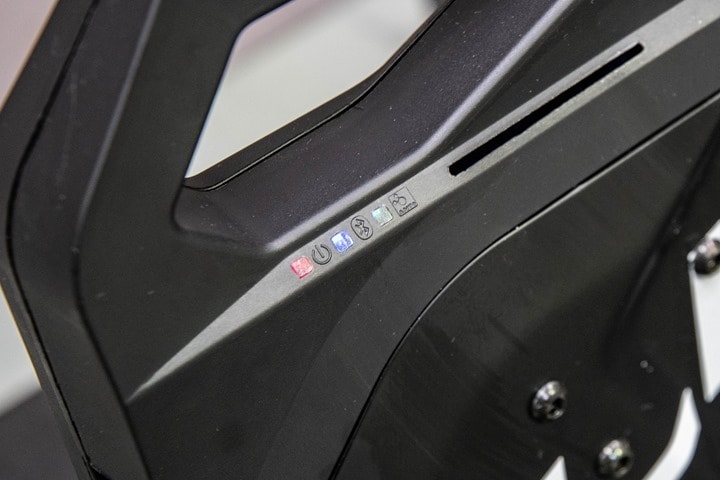
Ok, we’re almost to the recommendations. But we need to all be on the same table when it comes to some of the technical terms that we’re going to talk about. Notably, the protocols and communications side of how trainers talk to apps.
In the sports world there are essentially two camps: ANT+ & Bluetooth Smart. Virtually all devices use one or both of these low-power technologies to transmit and capture information such as heart rate, power, speed, cadence, and more.
In the trainer realm, that means trainers tend to support two types of things over these protocols. The first is simple broadcasting (one-way) from the trainer to the app/device that you’re using. This is done for the following on trainers:
ANT+ Broadcast: Power, Speed, Cadence
Bluetooth Smart Broadcast: Power, Speed, Cadence
Compatible devices, such as a Garmin/Suunto/Polar/Wahoo unit can pick up these signals and record them. The same goes for apps like Zwift, TrainerRoad, or Rouvy. Almost all trainer companies now broadcast dual on both protocols concurrently. No trainers in the 2020 guide fail to meet this requirement, to me it’s considered a baseline specification.
Next, for control there are basically two semi-standards that allow trainers to be controlled via apps:
Open/Standard Communication Channel: Via ANT+ FE-C (all trainers use this today) or Bluetooth Smart FTMS (most trainers have this today as well).
Private communication channel: Prior to FE-C and and FTMS there wasn’t a standard. So each company did their own thing. Wahoo, Saris, (once CycleOps), Tacx, Elite, Kinetic, etc… Most of these companies now support the ANT+ & Bluetooth Smart standard versions, but some of them also support their older variants to help out older apps.
For ANT+ FE-C, devices such as the Garmin, Stages, Wahoo, and Hammerhead cycling units support controlling the trainer straight from your head unit. This also means you can re-ride your outside rides (elevation changes and all) without any other software.
Meanwhile, for Bluetooth Smart, there’s FTMS, which is basically the same thing as FE-C when it comes to trainers. It’s not quite as widely adopted yet by trainer companies, but is by app companies. On the trainer company side only Elite, Saris, and Kinetic support it across the board. With Tacx having it on some but not all units, and Wahoo having it on no units (but all Wahoo and Tacx trainers support private Bluetooth Smart with all major apps anyway). Each year Wahoo and Tacx say they’ll get around to adding it to their higher-end units, and each year they don’t (practically speaking though, it won’t impact your app usage, since all major apps support Tacx/Wahoo variants anyway).
Ultimately, almost all major apps support all companies’ Bluetooth Smart implementations (whichever variant they’re on). Where the issue matters more is smaller apps that may not have the time to implement all the variants. Nonetheless, here’s where things stand.
Elite: ANT+ FE-C and Bluetooth Smart FTMS on all 2020 smart trainers.
Gravat: ANT+ FE-C and Bluetooth Smart FTMS on all 2020 smart trainers
JetBlack: ANT+ FE-C and Bluetooth Smart FTMS on all 2020 smart trainers.
Kinetic: ANT+ FE-C and Bluetooth Smart FTMS on all 2020 smart trainers.
Minoura: ANT+ FE-C and Bluetooth Smart FTMS on all 2020 smart trainers.
Saris: ANT+ FE-C and Bluetooth Smart FTMS on all 2020 smart trainers.
STAC: ANT+ FE-C and Bluetooth Smart FTMS on all 2020 smart trainers.
Tacx: ANT+ FE-C on all ‘Smart’ branded trainers (except Satori). FTMS on all non-NEO models.
Wahoo: ANT+ FE-C on all smart trainers. Gives developers access to private Wahoo Bluetooth Smart control, no proper FTMS support yet.
This all matters when it comes to apps – but the thing you need to know is that you want your trainer to be dual capable, and it should ideally support if you want resistance control across a broad number of apps. But ultimately, if you buy any trainer from this guide, it’ll be some variant of dual.
Kids Smart Trainer:
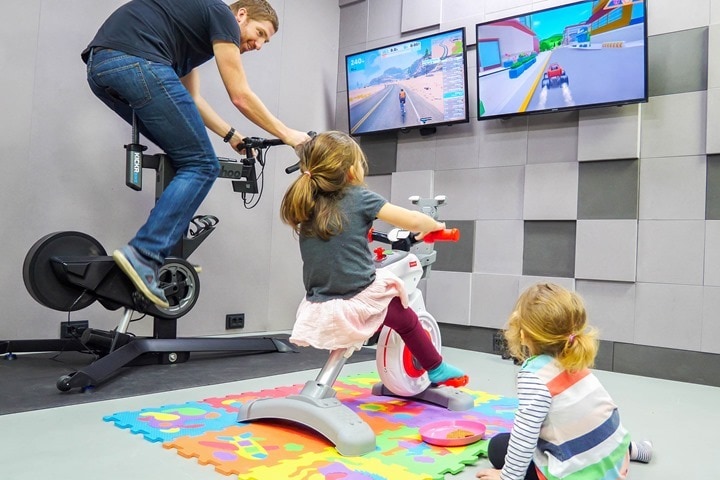
Wait, did you think this category wasn’t going to happen? Of course it is. Mostly cause I’ve got an epic review about this trainer and it’d be a failure to omit it somehow here.
For the money, there’s no smart trainer on the market which delivers as much functionality as the Fisher-Price Smart Cycle. App compatibility across virtually every larger-format screen you can think of, half a dozen themed apps with dozens of modules (courses) between them, and more alphabet games than there are letters. Now I know my ABC’s for sure.
Hardware-wise it appears well built. Even as an adult I could sit on the bike and it didn’t feel like it was going to fall apart. Albeit, I was unable to get my legs in the right position to pedal unless I used an accessory chair. Plus, neither the KICKR Bike or the NEO Bike can steer, or go in reverse. Also, neither have horns or bouncy options.
About the only downside would be the global availability – it’s mostly restricted to the US/Canada unless you can find an importer. The Amazon Europe sites all offer it, but they also add hundreds of dollars of shipping costs. Maybe there’s a business model for bringing in containers of these bikes to sell to athletic DCR reading parents. What triathlete cave wouldn’t be complete without this? Also, since my review last year, the price has skyrocketed from the usual $80 it had been for years….to…umm…far higher.
But hey, on the bright side – my girls love this more than ever before – and they still haven’t reached peak understanding for its capabilities, nor has the littlest peanut (not pictured above) even begun to sit on it.
Budget Smart Trainers (sub-$449):
There’s once again been almost no appreciable shift in this category this year, so things stay basically the same as last year. And, there’s really only a few entrants in this category anyway. Only Tacx, Elite, and in some areas Magene compete in this realm as a true smart trainer (ones where you can control resistance).
But let me be clear – there are TONS of trainers out there for less than $450 that don’t have any smart electronic gadgets in them and work just great. Really, there are. But there’s only a few units in this price range (again, looking at USD MSRP) that have ANT+ & Bluetooth Smart broadcasting of speed, power, and cadence…AND…control of the incline/wattage.
Lastly, this is the one category I don’t have a ton of riding time on either of those units. Both of them have been at trade shows or the like.
The main option that I can recommend is as follows:
Tacx Flow Smart – 239EUR/329USD: This is without question the least expensive smart trainer on the market, though it mostly is only available in Europe (some European companies may ship to the USA). This tops out at only 6% inclines and 800w. The 800w piece probably isn’t too challenging for most people, especially triathletes, but the 6% gradient may be tricky (of course, if you leave defaults on Zwift, you’re unlikely to notice). Still, it’s an incredible trainer for the money, and a great place to start if you aren’t sure you really want a smart trainer or not.
| Function/Feature | Tacx Flow Smart |
|---|---|
| Copyright DC Rainmaker - Updated June 8th, 2023 @ 1:27 am New Window | |
| Price for trainer | $369USD/€249 |
| Trainer Type | Wheel-on |
| Available today (for sale) | YEs |
| Availability regions | Global |
| Wired or Wireless data transmission/control | Wireless |
| Power cord required | Yes |
| Flywheel weight | 1.6kg (simulated 11.8kg) | Resistance | Tacx Flow Smart |
| Can electronically control resistance (i.e. 200w) | Yes |
| Includes motor to drive speed (simulate downhill) | No |
| Maximum wattage capability | 800w @ 40KPH |
| Maximum simulated hill incline | 6% | Features | Tacx Flow Smart |
| Ability to update unit firmware | Yes |
| Measures/Estimates Left/Right Power | No |
| Can directionally steer trainer (left/right) | No |
| Can simulate road patterns/shaking (i.e. cobblestones) | No | Motion | Tacx Flow Smart |
| Whole-bike physical gradient simulation | No |
| Can rock/tilt side to side (significantly) | No | Accuracy | Tacx Flow Smart |
| Includes temperature compensation | Yes |
| Support rolldown procedure (for wheel based) | Yes |
| Supported accuracy level | +/-5.0% | Trainer Control | Tacx Flow Smart |
| Allows 3rd party trainer control | Yes |
| Supports ANT+ FE-C (Trainer Control Standard) | Yes |
| Supports Bluetooth Smart FTMS (Trainer Control Standard) | Yes | Data Broadcast | Tacx Flow Smart |
| Transmits power via ANT+ | Yes |
| Transmits power via Bluetooth Smart | Yes |
| Supports Multiple Concurrent Bluetooth connections | No, just one |
| Transmits cadence data | Yes | Purchase | Tacx Flow Smart |
| Amazon | Link |
| Backcountry.com | Link |
| Competitive Cyclist | Link |
| REI | Link | DCRainmaker | Tacx Flow Smart |
| Review Link | Link |
Note for 2020: I’ve removed the BKool Smart Go from this list (previously $399USD), because the company sold off their trainer division late last year to a company called Zycle, which appears to be focusing purely on the Spanish market. Though, it’s not clear to what extent they’re actively shipping units.
Mid-Range Trainers ($450-$700):
While this is a very specific price bracket, it mostly captures the entire mid-range market. And to be perfectly clear: They’re all similar, despite looking different. There are minor nuances between these trainers, for which you’ll want to look at closely, depending on your needs. Specifically, look carefully at these four areas:
A) Maximum incline
B) Maximum wattage
C) Which protocols/standards/types they transmit on (i.e., power, but not cadence, etc…)
D) Flywheel weight
That’s about the only real tangible differences between them. They all have about the same road feel (and each company will tell you their road feel is better). They all have ANT+ FE-C and Bluetooth Smart control, and they all work with Zwift and TrainerRoad.
The flywheel weight, in theory, gives a more road-like feel, but the thing is, at these weights, it’s all kinda wimpy to begin with. I know a lot of folks want the most road-like feel, but my brain can’t really separate out the fact that I’m still inside looking at a wall going nowhere. I’d rather have greater accuracy and more app support than the mythical road-like feel. Still, at this level it’s definitely different between these $500-$600 trainers and those a $1,000+. The exception to this is the new Elite Tuo, which somehow manages really good road-feel. Perhaps because they spent a year after their planned release working on it. I don’t know.
This lineup largely stayed the same this year except two changes:
A) I added the Elite Tuo to the mix: Last year I mentioned it, but it hadn’t started shipping yet. Turns out, that delay would last a year, but it finally started shipping in September and my review was out last month. And I really like it, it has slightly better road feel in certain areas (namely initial ramping up, and shifting between speeds) than the KICKR SNAP. Not major, but it’s there. The other difference is that the Elite Tuo has a better system for mounting the bike (ignoring the mess that first-time setup instructions are). Specifically that, due to the back lever, you can get the exact same resistance amount each time, which means you know your calibration is the same each time. Whereas with the KICKR SNAP, getting the exact same press-on rotations after removing the wheel for an outside ride is trickier.
B) Removal of the 4iiii Fliiiight (previously by STAC): Last year this was on the list provisionally while I finished testing for my in-depth review. But ultimately, this year it’s hard to make that cut unless you fall in a very specific requirements range. Specifically, if you need an absolutely truly silent vibration-free trainer (it uses magnets), and if you’re a lighter weight rider (like a small female). OR, if you *ONLY* ride in ERG mode (e.g. TrainerRoad). While they have made some improvements in firmware, the bulk of DCR readers that have circled back to me say it’s just not ideal for regular Zwifting for heavier riders. Mind you, if you’re a lighter rider or just do ERG mode – then absolutely – go forth and enjoy all the magnety awesomeness. But overall as a recommendation at large, it’s just tough.
Moving along to the entire group, there are also very minor differences in how you mount your bike to each one in terms of the clasp/lever, but that’s too a wash. About the only notable difference here is that the Saris Magnus/M2 has a nifty resistance knob that makes it easy to ensure your bike is at the same resistance setting each time. It’s actually kinda brilliant. Just like the Elite Tuo with the toaster lever getting you to the same exact point each time is.
But no matter, all of these will require calibration about 10-15 minutes into a ride to ensure accurate numbers. With that in mind, here are your lower-priced options:
Elite Zumo – $699 (if you’re looking for direct drive at this price bucket)
Elite Tuo – $529
Kinetic Smart Control Road Machine 2018 Edition – $569
Saris (CycleOps) M2 – $499
Wahoo KICKR SNAP – $499
*4iiii Fliiiight $549 (only noted if you meet aforementioned requirements)
A few years ago I included the Bushido Smart, but it got kicked off the island this year as its price stayed static at $620 despite everyone else going lower, I don’t see any reason to pick up the Bushido Smart at that price. And similarly, the Vortex Smart is at $520, but spec-wise it just doesn’t compete with the others above from a simulation of incline or accuracy standpoint. Though again, being 2020 – beggars can’t be choosers, and there’s nothing wrong with it per se – it just wouldn’t make the list in a normal year.
I know a lot of folks will want some sort of concrete answer on which of the aforementioned trainers to pick, but the reality is that they are just so darn similar. That’s obviously on purpose, the companies have largely modeled them after each other, and thus the end-state is basically the same. I’d be happy with any of these five trainers. I think the KICKR SNAP is probably the most robustly built of the bunch, whereas I think the Magnus/M2 is the most accurate of the bunch (plus it has up to 15% incline resistance, which along with the Bushido is the most of the bunch). And the Elite Zumo is the only direct drive trainer of the bunch – which is super appealing.
If I were to really narrow it down, it’d probably be between the Elite Zumo if you can find it (distribution of that model is more rare), and the Wahoo KICKR SNAP or Elite Tuo. The SNAP & Tuo have better road-like feel than the Zumo, but Zumo has the convenience and accuracy of a direct drive trainer (in that you don’t have to worry about tire pressure. Accuracy of power numbers is equal, but in different ways. I’ve historically found the SNAP slightly more variable on the whole, whereas I find the Zumo can clip some sprints (meaning, it shorts you a bit). Overall, roughly a wash. Keep in mind though with the Zumo you’re still gonna spend another $50 for a cassette to put on it (and another $20 for tools if you or a friend don’t have them). Which means you’re within a few Starbucks visits of the $799 that is the Elite Suito – a more powerful trainer with better road-like feel that includes the cassette pre-installed.
Note: The Elite Zumo is not currently distributed by any retailers in the US (it is in Canada though, and in many places in Europe). This is up to individual retailers for whether they carry a given product, which may have different margins than the rest of the Elite lineup.
Here’s some nifty tables that might help narrow it down. Remember, you can make your own comparison tables here.
[Pop-open a new window to see all 6 trainers here, including the 4iiii Fliiiight]
| Function/Feature | Saris M2 | Elite Tuo | Elite Zumo | Wahoo KICKR SNAP (Current edition) |
|---|---|---|---|---|
| Copyright DC Rainmaker - Updated November 17th, 2024 @ 5:42 pm New Window | ||||
| Price for trainer | $499 | $580 | $699 | $499 |
| Trainer Type | Wheel-On | Wheel-on | Direct Drive (No Wheel) | Wheel-on |
| Available today (for sale) | Yes | Yes | Yes | Yes |
| Availability regions | Global | Global | USA | Global |
| Wired or Wireless data transmission/control | Wireless | Wireless | Wireless | Wireless |
| Power cord required | Yes | Yes | Yes (no control w/o) | Yes |
| Flywheel weight | 2.6lbs/1.2kg | 2.5kg / 5.5lbs | 4.2KG/9.2LBS | 10.5lbs/4.8KG |
| Includes cassette | N/A | N/A | No | N/A | Resistance | Saris M2 | Elite Tuo | Elite Zumo | Wahoo KICKR SNAP (Current edition) |
| Can electronically control resistance (i.e. 200w) | Yes | Yes | Yes | Yes |
| Includes motor to drive speed (simulate downhill) | No | No | No | No |
| Maximum wattage capability | 1,500w @ 20MPH | 1,250 (40KPH)/2,050 (60KPH) | 1,150w @ 40KPH | 1,500W @ 40KPH |
| Maximum simulated hill incline | 15% | 10% | 12% | 12% | Features | Saris M2 | Elite Tuo | Elite Zumo | Wahoo KICKR SNAP (Current edition) |
| Ability to update unit firmware | Yes | Yes | Yes | Yes |
| Measures/Estimates Left/Right Power | No | No | No | No |
| Can directionally steer trainer (left/right) | No | No | No | No |
| Can simulate road patterns/shaking (i.e. cobblestones) | No | No | No | No | Motion | Saris M2 | Elite Tuo | Elite Zumo | Wahoo KICKR SNAP (Current edition) |
| Whole-bike physical gradient simulation | No | No | No | With KICKR CLIMB accessory |
| Can rock/tilt side to side (significantly) | No | No | No | No | Accuracy | Saris M2 | Elite Tuo | Elite Zumo | Wahoo KICKR SNAP (Current edition) |
| Includes temperature compensation | No | Yes | Yes | Yes |
| Support rolldown procedure (for wheel based) | Yes | Yes | Yes | Yes |
| Supported accuracy level | +/-5% | +/- 5% | +/- 3% | +/- 3% | Trainer Control | Saris M2 | Elite Tuo | Elite Zumo | Wahoo KICKR SNAP (Current edition) |
| Allows 3rd party trainer control | Yes | Yes | Yes | Yes |
| Supports ANT+ FE-C (Trainer Control Standard) | Yes | Yes | Yes | Yes |
| Supports Bluetooth Smart FTMS (Trainer Control Standard) | Yes | Yes | Yes | Yes | Data Broadcast | Saris M2 | Elite Tuo | Elite Zumo | Wahoo KICKR SNAP (Current edition) |
| Transmits power via ANT+ | Yes | Yes | Yes | Yes |
| Transmits power via Bluetooth Smart | Yes | YEs | Yes | Yes |
| Supports Multiple Concurrent Bluetooth connections | No, just one | No, just one | No, just one | No, just one |
| Transmits cadence data | Yes | Yes | Yes | No | Purchase | Saris M2 | Elite Tuo | Elite Zumo | Wahoo KICKR SNAP (Current edition) |
| Amazon | Link | Link | Link | |
| Backcountry.com | Link | Link | Link | |
| Competitive Cyclist | Link | Link | Link | |
| REI | Link | Link | Link | DCRainmaker | Saris M2 | Elite Tuo | Elite Zumo | Wahoo KICKR SNAP (Current edition) |
| Review Link | Link | Link | Link | Link |
Mid-High End ($700-$975):
This is a tricky category, and where the vast majority of ‘innovation’ is occurring. Though, not necessarily product innovation, but rather just price innovation. Companies continue to pack more and more features and power into sub-$1000 trainers. Especially trainers in the $799-$899 price points.
And in some ways, these companies are slicing and dicing really thinly. For example with Tacx you’ve got the Flux S ($749) and Flux 2 ($899) both in the market. And Elite has the Zumo ($699), Suito ($799), and Direto XR ($949). When Elite released the XR, it had some very minor shifts from the X the year before except a bump in specs (albeit, useful specs). Just like when Tacx quietly (and unofficially) released the Flux 2.1 a year ago, it only sought to tweak a few internal issues from the Flux 2 a year prior.
But then there’s the KICKR CORE. When that came out Wahoo basically took a full 2017 KICKR and made it silent. They then lopped $300 off the price and changed the leg system. This meant that you got what up until that summer was one of the best trainers on the market that was loved by most, for $300 cheaper – and now it didn’t make any tangible noise. Well, until it broke. But I think those issues are largely behind us these days for people going out and buying new trainers. Point being, this category is more about hand-me-downs from the top-end units than new offerings. And frankly – that’s totally great. I’ll save $300+ for last year’s model by a different name.
In any case, as with last year, I think the value prop for the Elite Direto XR is tough (last year it was the Direto X). Specifically because the Direto XR is $949, while the KICKR CORE is $899. Sure, the Direto XR includes a cassette, but a cassette only costs about $50-$60 anyway, and more importantly, the KICKR CORE has (in my opinion) far better road feel. It also has dual-Bluetooth Smart channels, something super useful in 2020 as you end up with multiple devices needing to connect on Bluetooth Smart (both Elite and Wahoo still have endless ANT+ connections). Which isn’t to say the Direto XR is bad – not at all (in fact, ERG mode was quite good). It’s just that if I’m standing in front of both of them at their list prices, I’m gonna grab the KICKR CORE every time.
However, Elite still has the Suito priced at $799, which also includes a cassette. Like the KICKR CORE, it had a bit of a rougher initial launch hardware-wise (albeit, to a far lesser extent). And I think for many people the Suito is hitting a bit of the sweet spot. Or, Suito-spot. You get a direct drive trainer that requires zero assembly – pull it straight out of the box, plug it in, and you’re riding. And doesn’t cost anything more. With all the other direct drive trainers in this category you’ll still need to do some assembly as well as adding that $50 cassette (+ $20 in tool costs if you don’t have them).
Update for 2021: I’m happy to add the JetBlack VOLT to this list for the mid-tier. It proved very accurate in my tests, and passes all my other categories. It was basically the only trainer released in 2021, but it manages to make the trainer recommendation list because it definitely deserves it.
Wahoo KICKR CORE:
There’s really no surprise this trainer is here. Two years later and it still amazes me that more people don’t buy KICKR CORE’s over KICKR’s. It’s hard to get this level of a trainer road feel at this price, except of course when you see the Saris H3 on sale for $800 or something. But let’s be honest, that ain’t happening anytime soon again in the current environment. As I noted earlier, while the KICKR CORE had a rough initial launch period, I think most people would say that as of a year ago that was pretty well settled out. Sure, a few complaints here or there pop into my inbox – but no more than any other trainer/brand. Not to mention the fact that Wahoo continues to sell those units in higher volumes than ever before, so given that combination – I think this is solved.
In any case, ultimately, the CORE is essentially a 2017 KICKR that’s been muted with a non-adjustable leg. If you had told someone earlier that summer that they can buy a quiet KICKR for $300 less, albeit with no ability to adjust height – people would have scrambled for it. And, that’s what happened.
Finally, the CORE is compatible with the KICKR CLIMB. The fact that the CORE is compatible with the KICKR CLIMB means that you can get a CORE + CLIMB for $1,500, versus just a KICKR FOR $1,200. Said differently, you can justify to your significant other that you’re saving $300.
Elite Suito:
Next, we’ve got Elite’s pretty darn smart plan of simplifying the end user experience – rather than just throwing another trainer into the $700-$800 mix. With the Suito you get the cassette pre-installed on the trainer (they then continued this concept in 2020 with the Direto XR). The only other trainer that has that is the full Wahoo KICKR (at $1,199), though I think Kinetic has started offering the R1 with a cassette now. In any event, Elite even saves you $5-$10 by tossing in a front wheel riser. All while giving you a fairly capable direct drive trainer. Finally, it folds up easily for storage and comes entirely pre-assembled.
Now the key difference between the Elite Direto/X/XR and the Suito is the lack of power meter within it (called OTS by Elite). But keep in mind, having a power meter in it doesn’t really matter. What matters is whether or not it’s accurate. After all – neither the Tacx NEO nor the Wahoo KICKR series have power meters in them (in fact, Wahoo even ditched the power meter in theirs years ago due to accuracy issues). Of course, nobody is saying the Direto-X/XR isn’t accurate. It is. It’s incredibly accurate.
And in my testing, I’ve found the Elite Suito is pretty darn accurate. I have no issues with it from a Zwift or TrainerRoad standpoint, meaning no issues in regular riding, sprints, or doing ERG mode 30×30’s – all of which can be demanding. And while Elite did go through some teething pains last fall during the launch period, those seem to have completely evaporated pretty quickly, and I haven’t heard much commotion since last winter.
All in, I think the Suito is (again) this year’s best value for a trainer, especially if you aren’t really sure what you need or want. Sure, the Wahoo CORE has more inertia and thus slightly better road-feel. But the Elite Suito will basically save you $150 once you factor in the cassette cost.
Tacx Flux S:
Sitting at $150 cheaper than the CORE at $749, the Flux S is basically just the 2016/2017/2018 Flux 1 with a bunch of internal changes and support for longer derailleur cages. And by basically, I mean, that’s all it is. But that’s OK. The Flux 1 was incredibly popular and for good reason. It was the first direct-drive smart trainer below $1,000 when it came out, and supported all the apps people wanted. Thus, it’s an easy pick.
Now between this and the Elite Suito, it’s a tough call. It’s basically a wash price-wise once you factor in the required cassette. Form-factor the Suito wins because it can fold its legs for storage (and it actually has a handle, versus carrying around the Flux is miserable). Though the Flux is a bit beefier in terms of stability. Also, I feel like the Flux has slightly better inertia than the Suito, though I also think the Flux sounds a bit more ‘rough’ than the Suito does (a bit more gravelly, if that makes sense). But again, minor differences one way or another.
Neither the Flux S or Elite Suito is silent in the same way the CORE is. But ultimately, all those trainers make some amount of noise once you put a bike on it. After all, there’s still a drivetrain of metal on metal. No doubt the CORE is very quiet, but once you turn on a fan – all of these trainers are quiet in comparison.
| Function/Feature | Elite Suito | Tacx Flux S | Wahoo Fitness KICKR CORE |
|---|---|---|---|
| Copyright DC Rainmaker - Updated November 19th, 2025 @ 3:55 pm New Window | |||
| Price for trainer | $799 (incl cassette) | $749USD | $499 |
| Trainer Type | Direct Drive (No Wheel) | Direct Drive (no wheel) | Direct Drive (No Wheel) |
| Available today (for sale) | Yes | YEs | Yes |
| Availability regions | Global | Global | Global |
| Wired or Wireless data transmission/control | Wireless | Wireless | Wireless |
| Power cord required | Yes (no control w/o) | Yes | Yes |
| Flywheel weight | 3.5kg/7.7lbs | 6.7kg (simulated 25kg) | 12.0lbs/5.44kgs |
| Includes cassette | Yes (11 Speed SRAM/Shimano) | No | No | Resistance | Elite Suito | Tacx Flux S | Wahoo Fitness KICKR CORE |
| Can electronically control resistance (i.e. 200w) | Yes | Yes | Yes |
| Includes motor to drive speed (simulate downhill) | No | No | No |
| Maximum wattage capability | 1,900w @ 40KPH / 2,900w @ 60KPH | 1,500w @ 40KPH | 1800w |
| Maximum simulated hill incline | 15% | 10% | 16% | Features | Elite Suito | Tacx Flux S | Wahoo Fitness KICKR CORE |
| Ability to update unit firmware | Yes | Yes | Yes |
| Measures/Estimates Left/Right Power | No | No | No |
| Can directionally steer trainer (left/right) | No | No | No |
| Can simulate road patterns/shaking (i.e. cobblestones) | No | No | No | Motion | Elite Suito | Tacx Flux S | Wahoo Fitness KICKR CORE |
| Whole-bike physical gradient simulation | No | No | With KICKR CLIMB accessory |
| Can rock/tilt side to side (significantly) | No | No | No | Accuracy | Elite Suito | Tacx Flux S | Wahoo Fitness KICKR CORE |
| Includes temperature compensation | Yes | Yes | Yes |
| Support rolldown procedure (for wheel based) | Yes | Yes | Yes |
| Supported accuracy level | +/- 2.5% | +/-3% | +/- 2% | Trainer Control | Elite Suito | Tacx Flux S | Wahoo Fitness KICKR CORE |
| Allows 3rd party trainer control | Yes | Yes | Yes |
| Supports ANT+ FE-C (Trainer Control Standard) | Yes | Yes | YEs |
| Supports Bluetooth Smart FTMS (Trainer Control Standard) | Yes | Yes | YEs |
| WiFi or Ethernet | No | No | No | Data Broadcast | Elite Suito | Tacx Flux S | Wahoo Fitness KICKR CORE |
| Transmits power via ANT+ | Yes | Yes | Yes |
| Transmits power via Bluetooth Smart | Yes | Yes | Yes |
| Supports Multiple Concurrent Bluetooth connections | No, just one | No, just one | Yes, 3 Concurrent |
| Transmits cadence data | Yes | Yes | Yes |
| Bridging or re-transmission | No | No | No | Purchase | Elite Suito | Tacx Flux S | Wahoo Fitness KICKR CORE |
| Amazon | Link | Link | Link |
| Backcountry.com | Link | Link | |
| Competitive Cyclist | Link | Link | Link |
| REI | Link | Link | Link | DCRainmaker | Elite Suito | Tacx Flux S | Wahoo Fitness KICKR CORE |
| Review Link | Link | Link | Link |
High-End Trainers List ($999+):
Ahh yes, the vaulted space of the super expensive trainers. While the upper-mid tier of trainers gets closer and closer to these units in specs, the distinguishing aspects of the high-end trainers tends to be road feel and resistance ceilings (and to a lesser extent these days, accuracy which is equal/better than +/- 1%).
This category has mostly remained the same for years, until last year when Saris managed to join the ranks with the H3. And this year, the Wahoo KICKR v5/2020 remains in the contenders, though with a solid asterisks next to it – namely for accuracy. Just as the H3 gets an asterisk for noise levels (the KICKR and NEO are basically silent…the H3 is very much not). Though, the H3 is quieter than the Hammer 1 and Hammer 2.
Ultimately, in all three of these trainers you’re gonna be down to which nuanced feature matters the most to you. You’re basically left with comparing ‘extras’. By that, I mean that we’ve got what I’m going to call the ‘Move it’ features. With the Tacx NEO series that’s the ability for the trainer to simulate cobblestones and other road surfaces. It’s pretty cool in a geeky way, albeit without a ton of specific training value. Meanwhile, with the Wahoo KICKR (and KICKR CORE/SNAPv2) you can add their $600 CLIMB accessory, which simulates climbing by lifting the front of your bike up. The Saris H3 doesn’t move by itself, though you can spend an extra $1,200 for their motion platform. But that’s compatible with all trainers, Saris and non-Saris alike.
Tacx NEO Series:
You’ll notice I said ‘NEO Series’, and not just the NEO 2T. Because frankly, all of them are still really solid. The NEO 2 added some minor internal hardware over the NEO 1, and eventually Tacx plans to release Garmin Cycling Dynamics to the NEO 2T and NEO 2 based on that (but a year later…it’s still not actually there). Whereas the NEO 2T got substantially increased power from an internals standpoint.
With that, Tacx got rid of the low-speed slip-sprint problem of the NEO 1/2. That sub-second issue was rare for most people, but basically occurred if you were at very low speeds (like going up a steep hill, or just easy pedaling on the flats waiting for your buddy) – and then instantly sprinted hard. It would feel like the trainer ‘slipped’ for a fraction of a second. It never really bothered that many people with the NEO 1/2, but either way, it’s gone now. And…that’s it in terms of end-user differences.
Ultimately the NEO 1 and 2 trainers were usually the trainer I turn to when I’m not testing other trainers. It’s my go-to – and is what I have at home in the garage/shed (a NEO 2, not 2T). And for good reason: It requires no calibration, it’s really damn accurate, and it just works. Oh, and it vibrates. Everyone likes good vibrations. Technically they’re cobblestones or what-not on Zwift, but you get the point.
Still, I think I value most the accuracy pieces. I just don’t have to think about it. There’s not even an option to calibrate it – and nobody has seen any reason for them to include one either. It just works. It also folds up relatively small, though the lack of a handle is fairly awkward in the event you’re trying to move it frequently and for long distances. Did I mention it also looks like a ship from Star Wars? Cause seriously, that design is worth something (though, slightly less so with the new blue bottom on the NEO 2).
While the NEO 2T did have some initial accuracy issues when it was first announced, those were largely resolved in subsequent firmware updates to my satisfaction.
Wahoo KICKR 2018/V5-2020
When it comes to the Wahoo KICKR, they released a new version of their top-end trainer this past summer, the KICKR V5/2020. That trainer added in a zero-calibration feature, some squishier feet, and a wired connectivity port that’ll require an extra adapter (but isn’t yet available). But otherwise, it’s basically the same trainer as before in the KICKR 2018. Except accuracy, which I’ll discuss.
The previous version from the KICKR 2017 to the KICKR 2018 was the much larger jump, mainly due to it becoming silent. Also, that was the cut-off point for getting dual Bluetooth Smart channel connectivity (2018 and 2020 both support it – the only trainers on the market to do so). Technically the 2017 to 2018 jump also slightly increased the flywheel size, but most people can’t feel that difference side by side. I can’t, and GPLama/Shane Miller has said the same.
If you’re planning on buying the KICKR CLIMB, then obviously, get a Wahoo KICKR series unit. The CLIMB doesn’t work with non-Wahoo trainers. And yes, the CLIMB is fun to ride – it’s the ultimate in upwards/downwards indoor trainer movement (well, technically the KICKR BIKE has a greater range). Not to mention the fact that unlike the more expensive Tacx NEO, you actually get a cassette included here. Why on earth the NEO doesn’t include a cassette is (still!) beyond me.
Now – all that said, the KICKR V5 does have an accuracy issue that earns it a caveat. Specifically that the KICKR V5 has an issue with low flywheel speed and accuracy. I’ve outlined it in my review, and Wahoo says they’re working on a fix (though, three months to the day later and there’s still no fix). So in my case I saw it in some surges (spikes) in the KICKR V5 power values for short periods of times when at slow speeds and transitioning to mid-range speeds. A straight-up sprint didn’t see any issues for me. Others have reported similar results with the KICKR V5. I did not see this on the KICKR 2018 or KICKR CORE.
As for the squishy feet on the KICKR 2020 vs the previous edition, the so-called AXIS feet are actually available as a $79 accessory for any Wahoo KICKR trainer, which Wahoo says add increased tilt (up to 5°). In my testing there was zero difference on a trainer mat (since that squishes anyway), though a tiny virtually unseen difference on a harder surface like a concrete floor (sans-mat). Wahoo says that you’re more likely to notice it on much longer rides though (multi-hour). I wouldn’t let it be a decision factor at this point.
Finally, some people will ask about whether it’s safe to buy a KICKR 2020 (or even a KICKR 2018 if you can find one) in terms of some of the issues they previously had two winters ago. And at this point, I think it is. We’re now three months into the KICKR 2020 and I’ve only seen a handful of people report bad/broken units, which would seem to be well within the specs of typical one-off manufacturing failures. And given the substantially higher volumes this year of new trainers going out than years past, we’d hear about it otherwise.
Oh, one more thing – many people ask/debate which has better road feel, the KICKR series or the NEO series. It’s debatable. Everyone who has ridden this and the KICKR differs on which is more road-like. I could put 10 well-respected cycling journalists in a room and blindfold them and ride both trainers and they’d likely even have differing opinions ride to ride. I don’t think most people could tell blindfolded without having ridden one or the other extensively as their ‘main’ trainer first.
Saris H3 (Hammer 3):
I feel like the Saris H3 is the little trainer that could. In past years the H1 and H2 have always fallen short on the list. But last year the H3 finally climbed into the top recommendations list. With the H3 the company made some minor technological tweaks, but also substantially reduced the price. And that combination put it over the edge.
First up, from the technology side, they reduced the noise. I remember two winters ago Des of DesFit was at the DCR Cave doing a workout a few days after the Open House, and he curiously picked the then CycleOps H2 trainer as he wanted to give it a whirl as he hadn’t tried it yet. Well, the rest of us that day (GPLama, his wife Von, and my wife) certainly remember it – because it was so darn loud echoing around the concrete box that is the DCR Cave. Thankfully, Saris did a bunch of work to dramatically reduce that noise with the H3. It’s not as quiet as either the Wahoo KICKR or Tacx NEO, but it’s basically below the noise levels of most people’s fans.
Next, from a technology standpoint, they fixed the sprint overshooting issue this summer. In fact, both the H1 and H2 trainers got that firmware update – but it meant this was more accurate now.
However, the one strength of the Hammer series has always been just how darn good it is at ERG mode. If TrainerRoad were ever to acquire a trainer, I’m pretty sure they’d acquire the Saris Hammer series. Seriously. There’s no trainer that works better on TrainerRoad than the H3. Period. If you live in TrainerRoad, then you’ll love just how good the H3 feels. So smooth, so purposeful as it shifts between intervals. If I wasn’t so lazy moving around trainers, I’d probably ride the H3 anytime I rode TrainerRoad.
Finally, the last thing they did was reduce the price down to $999. This makes sense. They can’t compete on brand recognition with Wahoo or Tacx these days, and they can’t compete on silence. So…you’ve gotta compete on price. $999 is priced perfectly.
| Function/Feature | Saris H3 | Tacx NEO 2T Smart | Wahoo KICKR V5/2020 |
|---|---|---|---|
| Copyright DC Rainmaker - Updated November 15th, 2025 @ 7:06 am New Window | |||
| Price for trainer | $1,099 | $1,399 | $1,199 |
| Trainer Type | Direct Drive (no wheel) | Direct Drive (no wheel) | Direct Drive (No Wheel) |
| Available today (for sale) | Yes | Yes | Yes |
| Availability regions | Global | Global | Global |
| Wired or Wireless data transmission/control | Wireless | Wireless | Wireless + Wahoo Direct Connect Ethernet Adapter (Accessory) |
| Power cord required | Yes | No | Yes |
| Flywheel weight | 20lb/9kg | Simulated/Virtual 125KG | 16lbs/7.25kgs |
| Includes cassette | No | No | Yes (11 Speed SRAM/Shimano) | Resistance | Saris H3 | Tacx NEO 2T Smart | Wahoo KICKR V5/2020 |
| Can electronically control resistance (i.e. 200w) | Yes | Yes | Yes |
| Includes motor to drive speed (simulate downhill) | No | Yes | No |
| Maximum wattage capability | 2,000w | 2,200w @ 40KPH | 2,200w @ 40KPH |
| Maximum simulated hill incline | 20% | 25% | 20% | Features | Saris H3 | Tacx NEO 2T Smart | Wahoo KICKR V5/2020 |
| Ability to update unit firmware | Yes | Yes | Yes |
| Measures/Estimates Left/Right Power | No | Yes | No |
| Can directionally steer trainer (left/right) | No | No | No |
| Can simulate road patterns/shaking (i.e. cobblestones) | No | Yes | No | Motion | Saris H3 | Tacx NEO 2T Smart | Wahoo KICKR V5/2020 |
| Whole-bike physical gradient simulation | No | No | With KICKR CLIMB (Accessory) |
| Can slide forward/back with movement | With Tacx NEO Motion Plate (Accessory) | ||
| Can rock/tilt side to side (significantly) | No | Very barely | Barely...just barely. | Accuracy | Saris H3 | Tacx NEO 2T Smart | Wahoo KICKR V5/2020 |
| Includes temperature compensation | Yes | N/A | Yes |
| Support rolldown procedure (for wheel based) | Yes | N/A | N/A |
| Supported accuracy level | +/- 2% | +/- 1% | +/- 1% | Trainer Control | Saris H3 | Tacx NEO 2T Smart | Wahoo KICKR V5/2020 |
| Allows 3rd party trainer control | Yes | Yes | Yes |
| Supports ANT+ FE-C (Trainer Control Standard) | Yes | Yes | Yes |
| Supports Bluetooth Smart FTMS (Trainer Control Standard) | Yes | Yes | Yes |
| WiFi or Ethernet | No | Ethernet with Wahoo accessory adapter | Data Broadcast | Saris H3 | Tacx NEO 2T Smart | Wahoo KICKR V5/2020 |
| Transmits power via ANT+ | Yes | Yes | Yes |
| Transmits power via Bluetooth Smart | Yes | Yes | Yes |
| Supports Multiple Concurrent Bluetooth connections | No, just one | No, just one | Yes, 3 Concurrent |
| Transmits cadence data | Yes | Yes | Yes |
| Bridging or re-transmission | No | No | No |
| Race Mode (High Speed Data) | No | Purchase | Saris H3 | Tacx NEO 2T Smart | Wahoo KICKR V5/2020 |
| Amazon | Link | Link | |
| Backcountry.com | Link | Link | |
| Competitive Cyclist | Link | Link | Link |
| REI | Link | Link | Link | DCRainmaker | Saris H3 | Tacx NEO 2T Smart | Wahoo KICKR V5/2020 |
| Review Link | Link | Link | Link |
The Why I Didn’t Include It List:
First and foremost, this isn’t a list of bad trainers. If you take that away from this section, then you’re mistaken. In fact, there are some awesome trainers in here. Instead, this list is to save me time answering the same question 327 times below for each trainer as to why I didn’t include them. I’m keeping these explanations short and sweet. In many cases, I’ve detailed out longer answers in posts related to those products.
Elite Direto/Direto X/XR: Look, this is a great little trainer – and the *only* reason it’s not in the above list is purely because of pricing. At $949, the Elite Direto XR sits $50 more than the better road feel (and silent) Wahoo CORE at $899 (though, that’ll require a ~$50 cassette) – but still. Obviously, in Europe the pricing game shifts a bit. But it’s hard for me to track Euro pricing as it shifts about every 8 seconds based on whenever a given retailer decides to go even lower. So ultimately, I’d say you can kinda figure out what you value here in terms of price to features. But certainly don’t shy away from a good deal on the Direto X/XR – it’s solid for the right price.
Magene Gravat: Distribution is the main factor here. It’s largely only available in Asia, and while they do actually make some good trainers (see my review on it previously), it’s just hard to include when the majority of the world can’t get it. I’m looking to try and get the latest one, though distribution is frankly still the main issue here.
Kinetic R1: Oh Kinetic. You had so much potential with the R1. Unfortunately, it’s simply not accurate. Not even close to where it needs to be. I wish it would. They wish it would. And if they can sort that out (it’s been a year), then definitely – I’m totally there. Until then, I simply can’t recommend it.
Minoura Kagura DT (Not Direct Drive): While this almost made the cut for the mid-range trainer bucket two years ago, the accuracy was just a bit beyond the price point I’d expect. I think they’re getting closer on it, and depending on where you are (specifically, Japan), this may be a very good option based on the costs of other trainers being more expensive.
Minoura Kagura DD (Direct Drive): Is it even shipping yet? Still?
Tacx Flux 2: This originally came out two years ago, but my initial testing found ERG mode issues with accuracy being vastly off (10%+). They went back to work, and eventually quietly released a revamped version internally dubbed the Flux 2.1 which had physical hardware changes inside (+ new software). And while that fixed the ERG mode issues, I found other drop-out issues instead in my review this past summer. Thus, it’s a no-go for me.
CompuTrainer: They went out of business (or at least stopped making them) three years ago. I generally don’t recommend products that don’t have a sustainable support path. I do think if you can get a used unit under about $400, and know exactly which apps you’re using and if they’re compatible – then go forth.
LeMond Revolution Pro: The company has folded and ceased operations many years ago. Like CompuTrainer, they’re out of business.
Trainers FAQ:
Most of this is from years past, but I wanted to repeat it for this year. I’ve tweaked things where appropriate and/or where they’ve changed.
What about specific trainer tires?
I commented on trainer tires a long while back in a Weekly Mailbag post, so here’s what I said then – which still applies today.
I train every day on the stock wheels and tires that came with the bike. Just normal tires and normal wheels. In fact, I don’t even bother to swap out for a separate trainer tire. Why? Well, my thinking is that I spend 3+ days a week on a trainer, and the last thing I want to deal with is swapping tires or wheels every time I go inside to outside or the inverse (I’m kinda lazy that way). Further, when you step back and look at the total cost of triathlon or cycling, and the total cost of simply getting a new tire each year due to wear – the new tire is pretty low (between $30-45).
Now, if you’re riding race wheels with expensive race tires – you’ll have to balance the much higher cost of most race tires.
Do trainer tires make it quieter?
Nope, actually, not at all. And I proved this as part of my Tacx Genius review way back when – some actually make it louder. I’ve then further confirmed this with a few other tire companies as well. Most of them kinda silently laugh at the fact that people actually buy expensive trainer tires. Hint: Just use last season’s tire and toss it at the end of the winter.
The only benefit of trainer tires is that some tires will slowly shred tire specks over the course of the winter, depending on both the specific tire and the specific trainer. Not ideal in a carpeted living room, but not even noticed in a garage.
Why didn’t you recommend XYZ trainer or software instead? It’s waaaaay better!
As noted above, it’s likely because I haven’t used it. I’m pretty strict in that I don’t recommend things I haven’t used or know a lot about. I know magazines love to, but I don’t. Sorry!
Any tips or suggestions on where to place remote controls/jelly beans/bike computers/etc. while on a trainer?
Yup, you’re in luck. I’d recommend either a simple 4-cup OXO measuring cup (silly, I know, but it clips onto almost all road bike bars and triathlon bike aerobars – awesome). Or, you can build your own like I did here in this post.
What about that desk you use on the trainer?
Ahh yes, that desk is awesome. There’s both the Wahoo KICKR Desk, but also the near identical but slightly better version by 3rd parties here for half the price.
Do you use a trainer pad/mat (floor protector)?
Sometimes. You can find endless numbers of them online or at your local bike shop – usually around $30. You can also just use a towel, just be sure that if you’re on carpet that you change the towel regularly, otherwise it’ll eventually stain the carpet below (sweat going down into it). Here’s the thing, don’t overspend on this – that’s silly. You don’t need a $70 trainer mat. As long as it’s waterproof (thus, sweatproof) and offers some padding to lower sound profiles, that’s really the key thing.
What’s the quietest trainer?
It’s easily the 4iiii/STAC Halcyon/Zero trainers – but those have some limitations. Beyond that, it’s the the Tacx NEO 1/2/2T, and the Wahoo KICKR/KICKR CORE which are super quiet.
How do you test for accuracy? Or, how can I see if my trainer is accurate?
Simple – follow my full post here where I go into both testing and troubleshooting your trainers and power meters for accuracy.
What about generic rollers, any thoughts?
I don’t have a ton of experience on rollers unfortunately. I have recently tested the InsideRide solution with the floating fork, and I found that super compelling. But it’s hard to recommend that for most people, given the accuracy and price limitations.
In any event, I find that the cross-over between people who really like riding rollers and the people who really like the technology aspect tends to be rather small. Said differently, roller people tend to be more purists who don’t want technology in the way (not all of course, but most).
What about one of those bike protective thong cover things?
Do I look like an Instagram supermodel? No (especially given how little I post). Thus, my bike isn’t either – I don’t cover up my bike. I’ve spent A LOT of time on my bike, pouring a lot of sweat – many multi-hour rides. But you know what? I’ve never seen any adverse issues due to it. Perhaps I’m lucky, perhaps it’s not normal. Either way, I don’t use one. That said, Tacx released a cool one that actually has a cell-phone holder built in (with a protective plastic cover). Kinda neat.
Favorite Trainer Accessories:
People always ask my favorite trainer accessories, and these are the ones that I use most frequently/daily. I’m a simple person in that respect, I typically don’t need the fanciest versions of these things. I’m happy with a $10-$20 trainer mat, a $7 front wheel block, and the cheaper trainer desk. Also, I’ve been using that fan listed below for a few months – both the US variant (Lasko), and the EU/UK variant (Vacmaster). If you’re in the UK/EU, you’ll get the correct one when you click on it automatically.
| Product | Amazon | Note | |
|---|---|---|---|
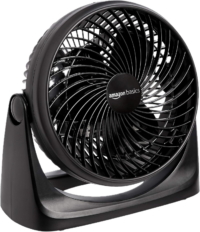 | Amazon Basics Fan | Amazon | I've got three $15 fans floating around the DCR Cave (previously Honeywell ones, but seems to be rebranded as Amazon Basics now), and I frequently use them on rides. They work just fine. Sure, they're not as powerful as a Wahoo Headwind, but I could literally buy 20 of them for the same price. |
 | Apple TV 4K 64GB WiFi (2022) | Amazon | There's no better bang for your buck in getting Zwift (or FulGaz/etc) on your big screen TV than Apple TV - it's the primary way I Zwift. |
 | Basic Trainer Mat | Amazon | This is a super basic trainer mat, which is exactly what you'll see me use. All it does is stop sweat for getting places it shouldn't (it also helps with vibrations too). |
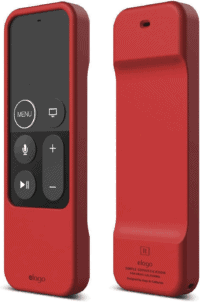 | Elago R1 Apple TV Remote Silicone Case with Strap | Amazon | I use Apple TV for Zwift the vast majority of the time, but also just for watching YouTube/Netflix/etc on the trainer. The Apple TV remote sucks though. This $8 case fixes that, it's a silicone strap that makes it easy to grab, but also has a strap to easily place on the edge of your handlebars. Boom! Note: Not compatible with 2021 Apple TV Edition. |
 | Front Wheel Riser Block | Amazon | Here's the thing, some people like front wheel blocks, some don't. I'm one of the ones that do. I like my front wheel to stay put and not aimlessly wiggle around. For $8, this solves that problem. Note some trainers do come with them. Also note, I use a riser block with *every* trainer. |
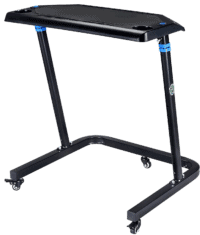 | Indoor Cycle Trainer Desk (RAD/CXWXC/Vinsetto/Conquer/etc...) | Amazon | This desk is both a knock-off of the original KICKR Desk, but yet also better than it. First, it's got wheel locks (so the darn thing stays put), and second, it has two water bottle holders (also useful for putting other things like remotes). I've been using it as my main trainer desk for a long time now and love it. Cheaper is better apparently. Note: Branding varies by country, exact same desk. |
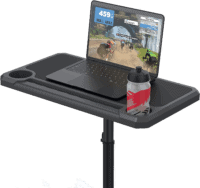 | KOM Cycling Trainer Desk | Amazon | This is by far the best value in trainer desks, at only $59, but with most of the features of the higher end features. It's got multi-tier tablet slots, water bottle holders, non-stick surface, adjustable height and more. I'm loving it! |
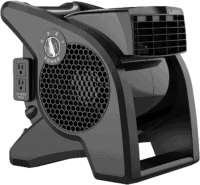 | Lasko High Velocity Pro-Performance Fan (U15617) | Amazon | One of the most popular trainer fans out there, rivaling the Wahoo Headwind fan in strength but at a fraction of the price. It doesn't have smartphone/ANT+/Bluetooth integration, but it does have secondary outlets. I've been using it, and a similiar European version lately with great success (exact EU variant I use is automatically linked at left). |
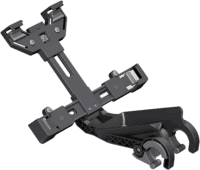 | Tacx Tablet Bike Mount | Amazon | I've had this for years, and use it in places where I don't have a big screen or desk, but just an iPad or tablet on my road bike bars. |
Buy Now, and support the site!
If you’re looking at any of the above devices, you can support the site by making purchases through any of the below links. Here’s a handy table of everything mentioned above that I have a review on. Thanks for reading, and thanks for considering to do your shopping through the links on this website.
| Product | Amazon | Competitive Cyclist | |
|---|---|---|---|
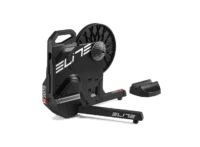 | Elite Suito $799 (incl cassette) | Amazon | Competitive Cyclist |
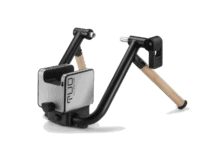 | Elite Tuo $580 | Amazon | Competitive Cyclist |
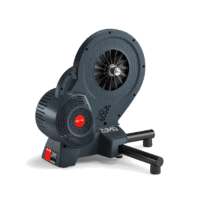 | Elite Zumo $699 | ||
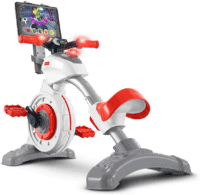 | Fisher-Price Smart Cycle $89-$299 | Amazon | |
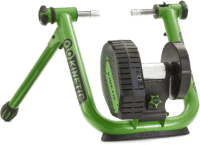 | Kinetic Smart Control 2018 (Road Machine/Rock & Roll) $569 | Amazon | Competitive Cyclist |
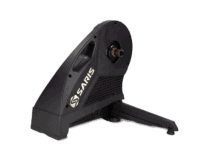 | Saris H3 $1,099 | Amazon | Competitive Cyclist |
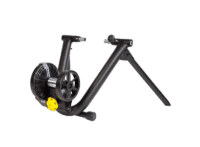 | Saris M2 $499 | Amazon | Competitive Cyclist |
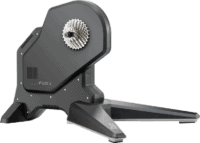 | Tacx Flux S $749USD | Amazon | Competitive Cyclist |
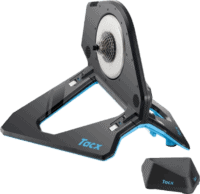 | Tacx NEO 2T Smart $1,399 | Amazon | Competitive Cyclist |
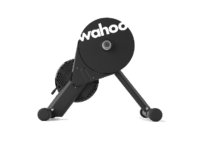 | Wahoo Fitness KICKR CORE $499 | Amazon | Competitive Cyclist |
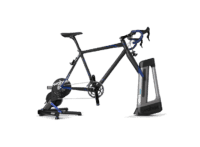 | Wahoo KICKR + CLIMB Bundle | ||
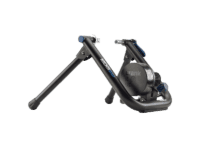 | Wahoo KICKR SNAP (Current edition) $499 | Amazon | Competitive Cyclist |
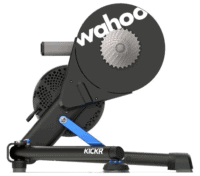 | Wahoo KICKR V5/2020 $1,199 | Competitive Cyclist |
Thanks for reading! And feel free to drop any questions below, I’ll be happy to answer them.

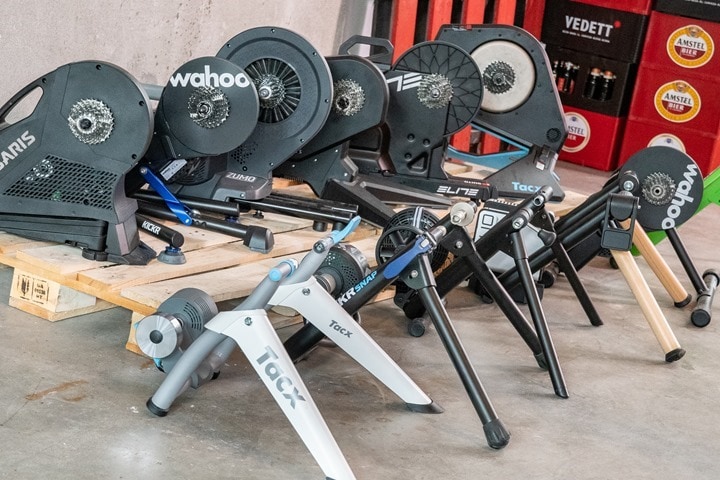
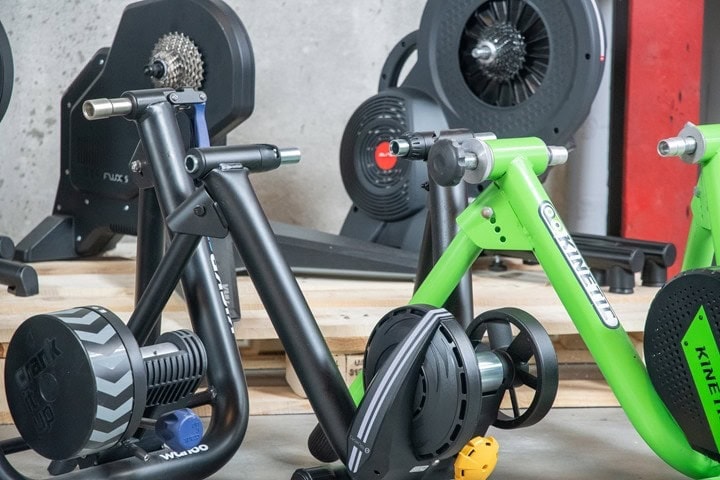
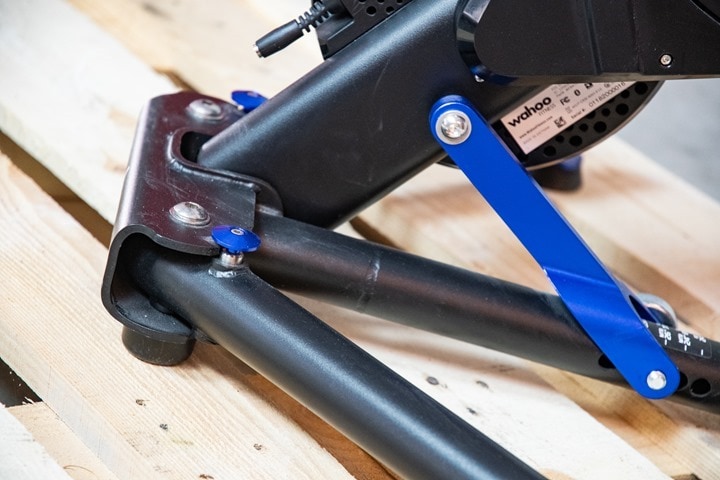
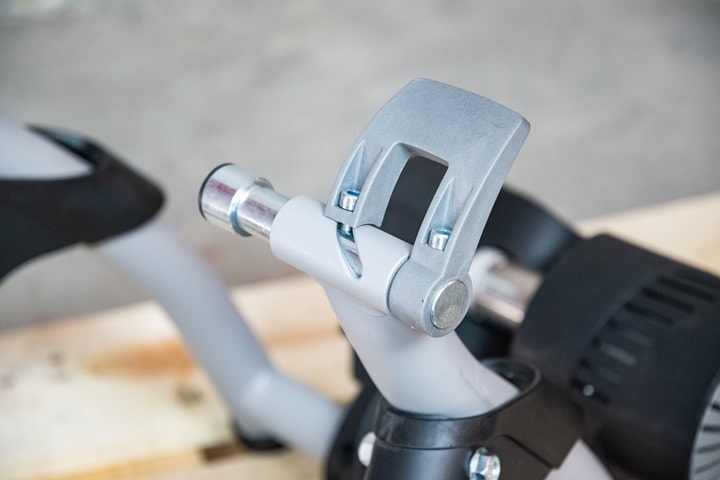
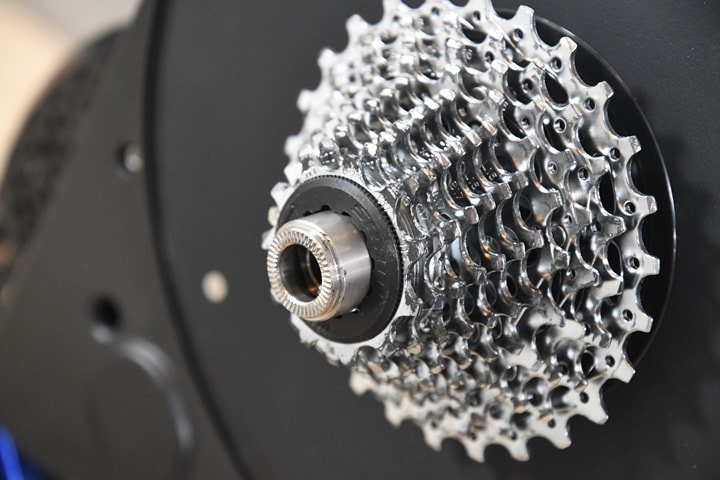
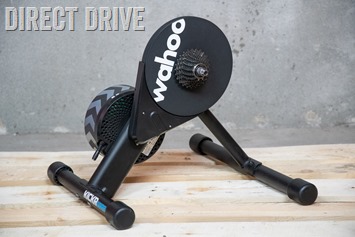
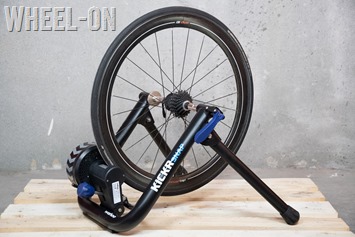
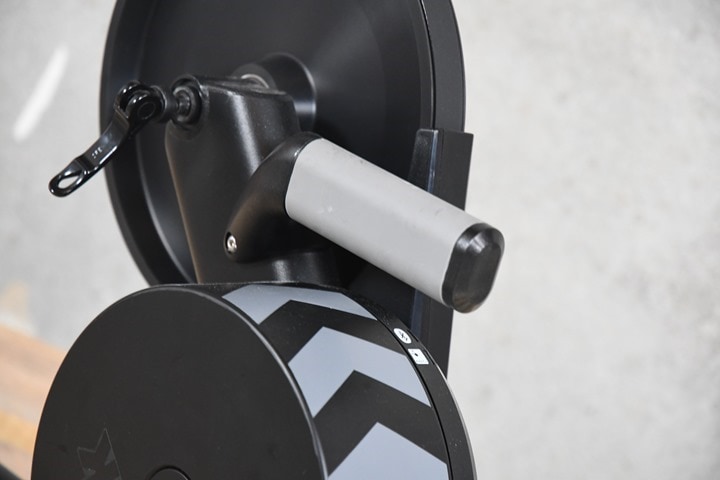
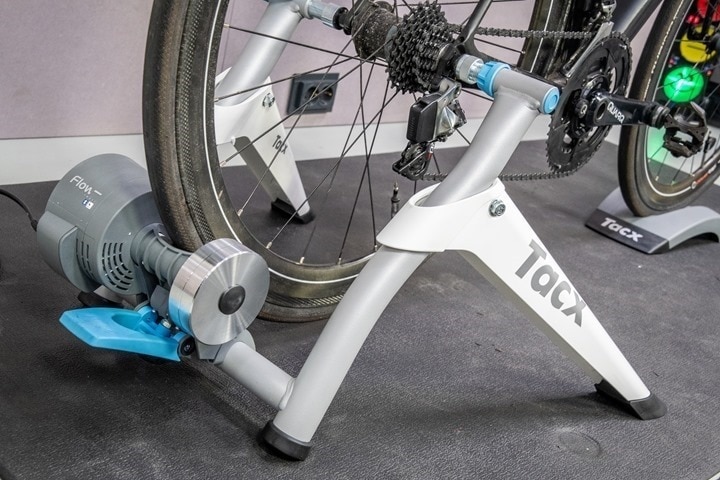
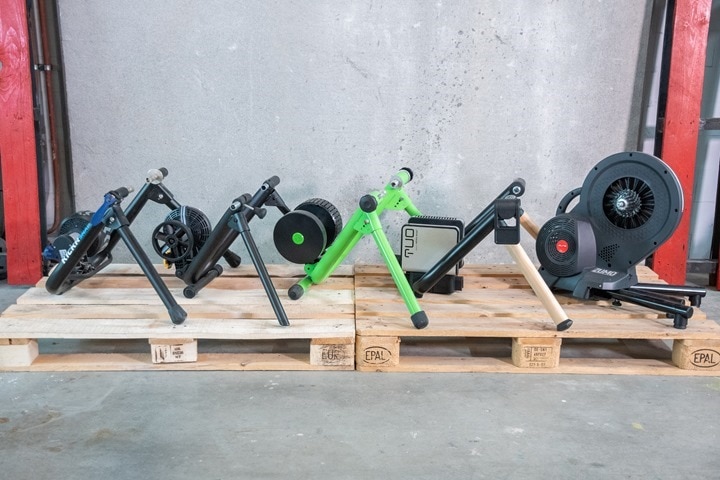
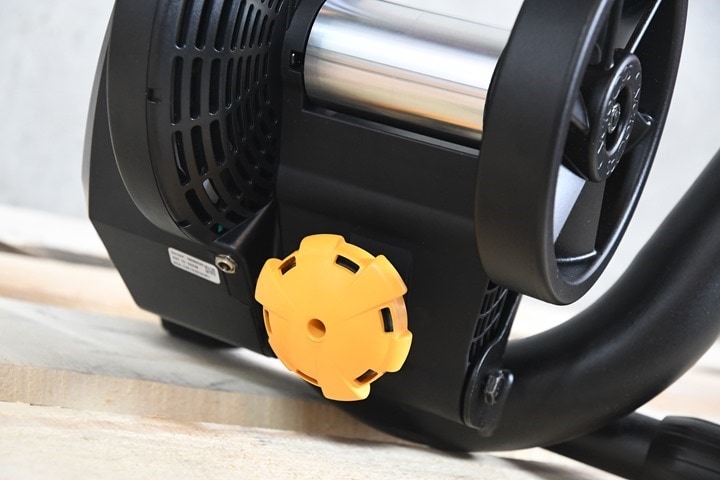
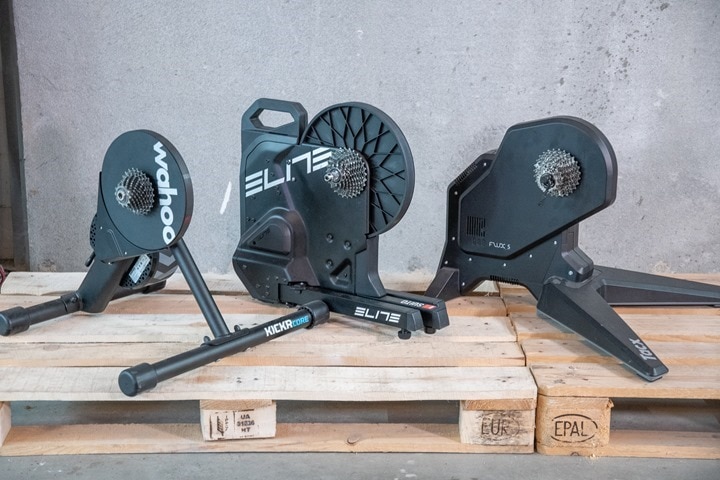
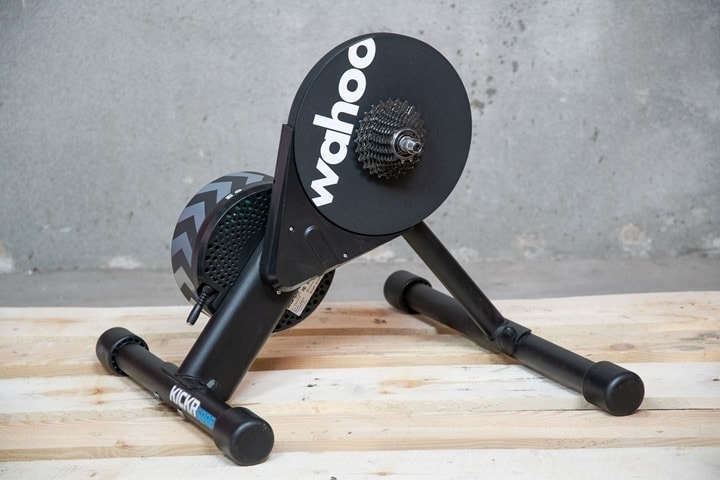
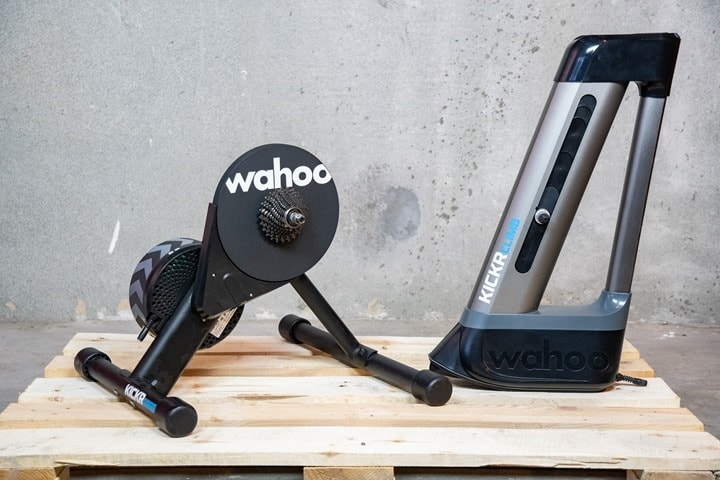
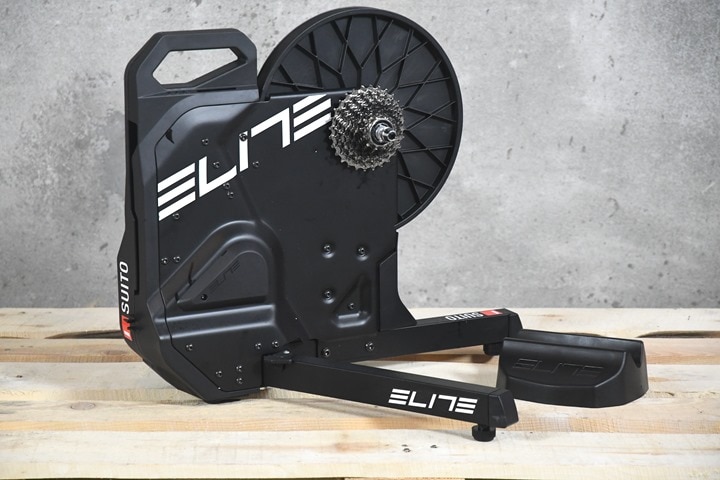
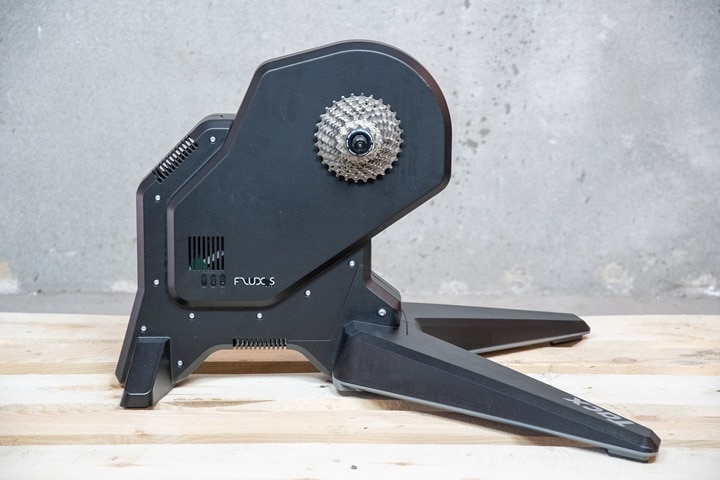
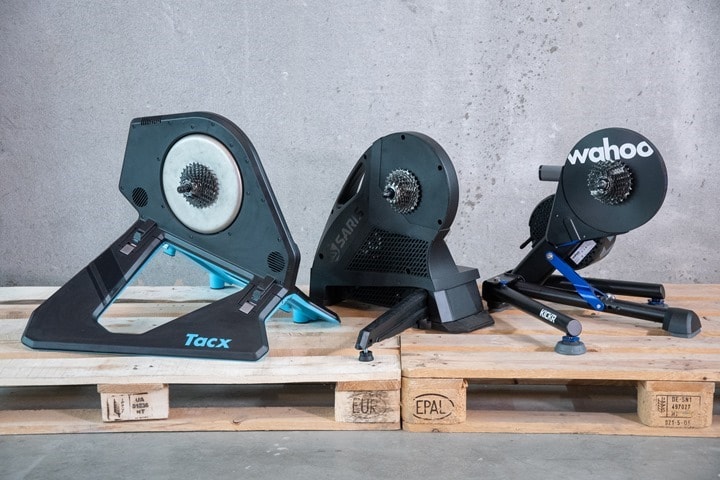
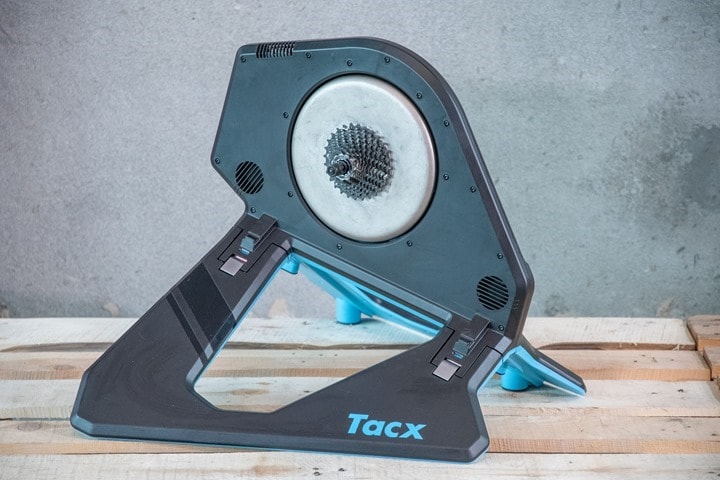
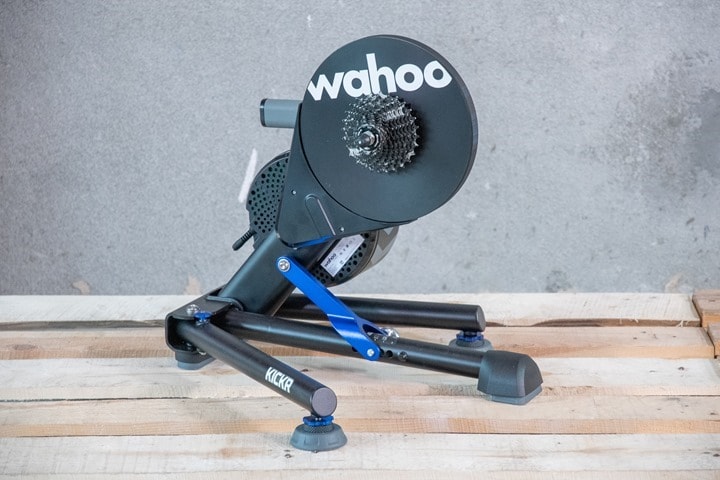
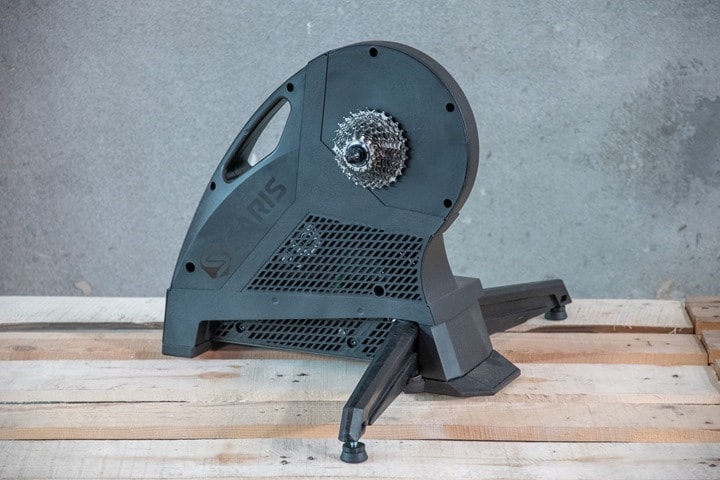
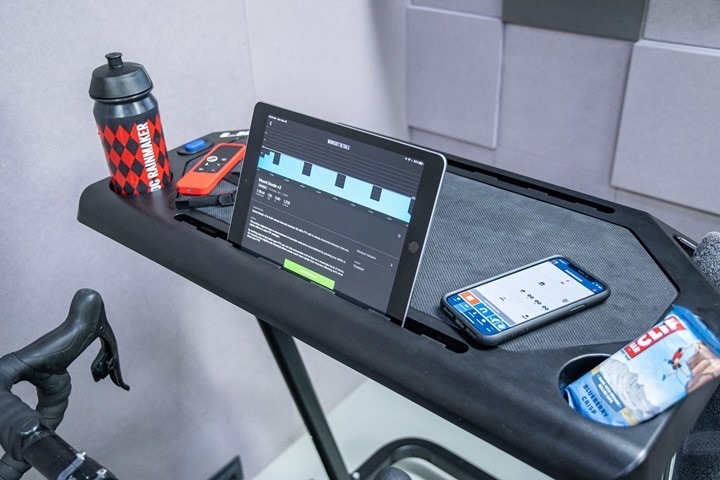
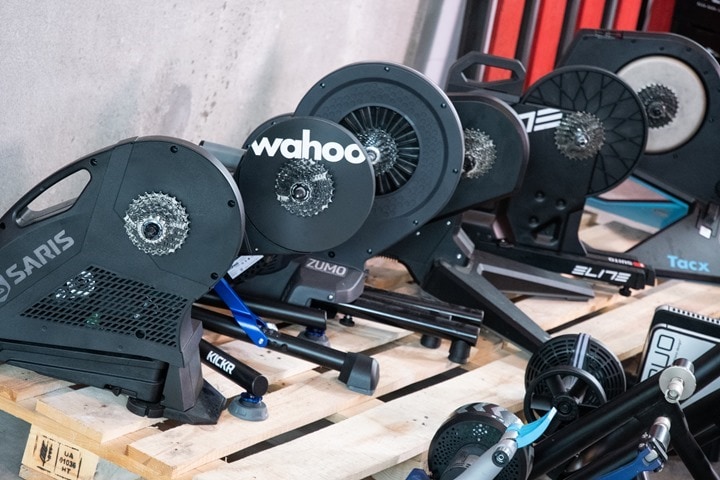



















Out of curiosity – how about the Elite Drivo 2?
It’s a bit old these days. And, I suspect it’s darn near impossible to find.
That said, it produces really solid ERG mode tracks and there’s nothing wrong with it, it’s just simply past its prime in price/noise/size type realms.
I’m still on my Drivo 1 and I’m thinking it’s time to upgrade. The ERG is getting slower to respond to changes (up to 10 seconds) and sometimes makes it easier instead of harder and then WAY overcompensates which brings me to a grinding halt. It is getting super squeaky and whiney too. Great trainer the first few years though.
Hello Ray,
Thanks for this guide ! What are your thoughs on the Xplova NOZA ?
I’ve been chatting with them since summer, and they discussed getting a unit to me in September, but seems keep sliding. It sounds like they were concerned about where it stood, before then. :-/
Just picked up a Neo 2T, I think that it now has the cycling dynamics in it now. At least I’m getting left-right balance etc from the device.
On Tacx software or on the gps computer?
Regards
It’s had left/right balance since the start. However, it’s still lacking the true ‘Cycling Dynamics’ metrics they initially promised (and even published an article about briefly back this past spring), stuff that Vector or Assioma would have in it.
Hopefully soon…
I can see power phase data etc on my tacx neo bike. I assumed this was the same on the neo 2t?
On the NEO 2T you get two digits within the power phase, but it’s actually not the power phase data, it’s just the left/right data shown on that page in the power phase section (whereas you should also get a graphical loopy thing shown too).
Later on Garmin Connect, it’ll only show the let/right power balance.
How does it work out/calculate the L/R balance on the Neo 2/2T?
It’s basically just an estimate using assumptions and an algorithm based on the crank speed as it passes past the frame where there’s sensors instead.
Ultimately, I didn’t find it that accurate in my previous testing.
Neo 2T with current firmware (0.36) provides L/R balance and L/R pedal smoothness. These stats both match my Garmin Vector 3 pedals, it doesn’t provide other cycling dynamics stats: standing time, platform centre offset or power phase.
Good stuff. I picked up a refurb CORE for $579 last black friday, and given what has happened since then, that turned out to be a deal of a lifetime. I’m guessing no such deal this year.
I’m here to suggest an alternative mat. I use the Stamina folding mat. They’re cheaper than the one noted, they fold away nicely when you’re not using them, and my current one has I’ve had for 7 years and it looks like new. So good I just bought another one as my wife wants to train next to me this winter, and the new one is indistinguishable from the 7 year old one, despite many 10,000s of miles of training.
link to amazon.com
It may be useful to offer a measure of the customer service level from trainer companies. A lot of noise / complaints about Garmin Tacx since lately and many Neo fans are recommending their friends to purchase a Kickr based on customer support and warranty policies.
So it’s funny, I think it really depends on where you ask. Meaning, the variations in customer service tend to be driven mostly on where you’re located. For example, prior to the acquisition, Tacx support in the US largely sucked. These days, you call Garmin instead, and overwhelmingly I hear people way happier there.
As for warranty polices, that’s also better too (literally, Garmin extended support on ones that were effectively out of support by Tacx) – so I don’t really understand that line of thinking from some.
There’s plenty of good reasons to buy a KICKR over a NEO, but I’m honestly not sure those above are those reasons.
I thinking about Elite tuo or cheaper Tacx Flow smart. Do you think Elite tuo is producing less noise? Or you have some data “which wheel on” trainer is more quiet? Thank you very much!
Be aware the flow has a limit, if too much power output for some time for example the Alpe on Zwift it just stops and needs to cool down.
So for less powerfull riders the flow is good and cheap, but for powerfull riders it’s not good. It’s good as a basic trainers
I haven’t done a side by side test of noise there, but they would be roughly similiar in my ears from testing them a few months apart.
As JB noted though, the Flow is a less powerful trainer, so keep that in mind.
The 800 Watt max of the Flow sucks for sprint workouts but I’ve never had it overheat and turn off on longer climbs at high wattage. Including several sub 40 min climbs up the Alpe and sub 60 min climbs up Mt. Ventoux.
What if you put zwift on max. Trainer difficulty? I always ride like that
Wahoo Kickr Core – $899
vs.
Saris H3 – $999
That’s super tough. I think ultimately, if you want silence, go CORE. But if you’re a TrainerRoad person – definitely go H3. It’s just SO SO SO good at ERG mode.
I just read that Saris does not make a Campagnolo freehub so my decision is a little easier now. Thanks Ray!
Not really sure that using a Shimano cassette with a Campy group would be a problem at all (if we’re talking about 11 speeds, not sure about 12). A friend of mine is currnetly using a Shimano cassette with the campy drivetrain since more than a year on his main road bike, and without any issue at all (not shifting, not silence, not wear).
A huge repertoire of knowledge, thank you.
In the name of buying any thing you can find what second hand units that are no longer made would you recommend?
I think in general it might be best to look at my past 2018/2019 recommendation guides as a starting point, as I list both the included and non-included units in each.
It’s hard to go through a complete list of great units out there. But I think solid ones are any of the Tacx NEO series are great options. Most people are pretty happy with many of the more recent KICKR’s, and if you don’t mind the sound of the older Hammer 1 or H2, those are frankly nearly identical to the H3.
Elite’s Drivo 2 was a solid unit as well.
I use a 60×36″ rubber carpeted entry way mat. Lowe’s, Home Depot, etc.. $18 at HD right now. 60″ is long enough for the trainer and bike. Impervious to sweat, oil, grease…
The DIreto XR is sold in Italy at 849€ (i have bouht mine well under the 800..) with the casette e it’s a 1.5% precision trainer with 24% incline sim and it ‘s ….out of the list.
I don’t think it deserve this treatment even if it s mentioned in the ‘loser’ list…
For 1300€ (official tacx price so i only have to add 450€) i can buy…the cobblestone simulator :)
The challenge though, as I noted in the article a few times is that EU pricing is mostly a mess. So, trying to track against it is impossible since it varies day to day by where one can find the best deal (as you noted).
Hence why I use US pricing as the baseline. As always, situations might vary that make it a better deal.
Ultimately though, while the XR is a very good trainer, it’s just hard to see why I would want one over the competition, except for the higher incline specifications. And realistically, 16% (the KICKR CORE) is basically more than the vast majority of people ever ride. There’s only a handful of places in Zwift or elsewhere that go by 16%, and even then for very short periods of time. As I think Elite themselves even noted last year when lauching their other trainers, it’s largely a gradient race to silliness.
As always, there may be edge cases for things, but my goal here isn’t to make every brand happy with including every unit. It’s to talk about what I’d actually recommend per category, given standardized pricing.
Ray what i’m saying is that (in an extremly synthetic) for the price of mid/high trainer we have the performance of an high end one…that cost something like 50% more (or only 40%). I’m not saying it s the best buy for everyone but that it could be included in one of the list.
I don’t have a beef with it, but I a little biot with Fabio on this one. Why is direto xr bunched with mid- high end and not with the high end. What is it missing (apart from price) to mix it with the big boys?
Ultimately, having ridden them side by side, the Direto XR is a good trainer with nice ‘specs’, but what it doesn’t have is the same level of ride feel as a KICKR/H3/NEO, nor does it have the silence of the KICKR/NEO, and finally, it lacks any of those top-tier type feature-unlocks like KICKR CLIMB compatibility or ride feel stuff. So, they’ve priced it slightly under the “big boys” (as you said), but it also lacks in those core things that really separate it from the big boys. Ultimately, because it’s basically just a slightly tweaked Direto.
Again, I’m not saying that it’s a bad trainer. But I’m just saying it doesn’t really fit in that upper category, and once you get into the mid category, it’s still a tough sell against the CORE, save for gradient to the point where I don’t think 98% of people care.
…just my two cents.
i think ray it s about how someone categorize the Direto XR. With perfomances it’s really close to the ‘big ones’ event if the road feel is not so good…but i also own a lemond revolution that i think is the best ‘road feelin’ trainer but i don’t feel all that difference compared to my direto 2017.
On the price side its competitors are the core and the flux2 but with these one the specs are not so good So IMO the great value is that it ‘s a medium-high-medium end trainer :)
You can find it at around 750€. That’s the price I paid for mine. That’s the best ratio quality/cost of all the HT.
Maybe this isn’t a great format then.
Just stack rank all the trainers by actual functionality, not by price. Say this is the best by noise, best by ERG, best by connectivity. Prices have changed substantially since you posted this article, and I have no idea what to get in any price range.
Any input on the JetBlack Volt?
I haven’t seen one yet. I asked a long time ago, but hadn’t heard anything. :-/
Hello Ray,
Amazing guide as always. Are you perhaps planning to publish similar one regarding GPS smartwatches?
Cheers
Yup indeed! Likely later next week.
Budget trainer: “The two options that I can recommend are as follows:”
Did you miss one, or is the TacX the only recommendation?
Doh, typo fixed. Thanks!
I purchased a Tacx Vortex at 250€ back in March, partly because that was one of the only ones I could find in stock back then. A relatively old model but a decent deal as far as I can tell (it normally goes for 300+€).
What bothers me the most is mounting/unmounting the bicycle, especially as all of us 5 at home got an interest in this kind of exercise. I ended up dedicating an old bicycle to the trainer, luckily we are no too dissimilar in size and can all find a reasonable fit.
Still, I think that, should we get serious about this kind of pain, I’d seriously consider a fixed smart bike.
On the software side, I actually quite like the latest Tacx Training version which is now totally free and has plenty of movie and GPS trainings.
I love the kids smart trainer ?
I love the kids smart trainer ?
I still occasionally pull up the review to get some laughs :)
And my 3 year old son loves it.
Got a WAHOO KICKR in April and it has been flawless. 10 one hundred milers, 32 races, many times up the big climbs on ZWIFT. Zero issues.
Great guide (as usual) – agree with your comments on the Tacx Neo – I use mine with TrainerRoad and always know it locks onto workouts in ERG mode and is ultra accurate. Would be very interested in a similar smart bike review with both models of the Peloton bike included.
Hi,
What do you think about a Elite DRIVO 1 ?
Thanks a lot.
Ray does it make more sense to add a Kinetic Smart control unit to an existing Kinetic fluid trainer or get a toaster err Tuo? I am like “the Girl” and not a fan of taking the wheel on and off with only one road bike. Kids schedules dictate trainer vs outdoor ride.
Yup, totally valid way of doing it. I haven’t done a side by side though with the Tuo vs Kinetic Smart Control to see which one has better road feel though.
Can`t find the EU version of the Lasko Fan – the link shows a us version with us power sockets (on Amazon UK). Do you have a link to the EU version
A TrainerRoad forum user shared this model in the UK, that also offers a discount. I am pretty sure other EU users have been able to snag them:
link to trainerroad.com
Weird, I must have done my conversions wrong (out of curiosity, which country were you viewing the link from)?
In any event, these links should work:
Amazon Germany (EU-style plugs): link to amzn.to
Amazon UK (UK-style plugs): link to amzn.to
I’ve been using the Vacmaster and Lasko fans alternating each workout. No major differences between them in terms of airflow. The Lasko has ports on the side, the Vacmaster has one atop it under that cover.
I was about to say the same thing – I also get the Lasko (German amazon) when viewing from NL ;-).
Thanks for the updated links!
Ok, I think I’ve got the manual overrides all in for all the Amazon EU countries. However, the NL site is unfortunately the only one that doesn’t have it listed*. But, Amazon DE does have it.
*As I’m sure you know living in the Netherlands as well, the Amazon NL site is probably best described as “a work in progress”. Obviously it’s basically just a re-skinned Amazon DE site, but with a bunch of weird quirks on some products being available/listed or not.
Definitely – but I was curious about the Vacmaster and wondering whether or not the one I found on amazon.de was the right one ;-)
I believe you put too much emphasis on the cassette being included with the trainer. I don’t own an 11 or 12 speed bike so it is just a paperweight to me. If I did own a 12 speed bike it would be by definition be my good bike and I would not use it on my trainer. Finally you assume the tooth pattern of the cassette provided suits your training workout regime, which may not be the case. Taking all these factors into account, the true discounted value of the cassette is about $10.
While that argument holds true for those that don’t have a compatible bike, the overwhelming vast majority of people do have 11 speed bikes.
As for placing weight on it, it actually doesn’t impact really any of the categories here meaningfully, as evidenced by the fact that the Elite Direto XR doesn’t make the cut (with cassette) while the KICKR Core does (without).
Thanks so much for the review Ray! Just ordered a neo 2T, really excited to try it! (I’ve only ever ridden a Tacx Flow, so for sure an upgrade!)
Very nice – enjoy it!
Kickr Core seems to be sold out or no longer available @ the links provided :(
Never thought I’d be into buying a trainer, but I think it’s time to upgrade from my Keiser M3i and put my road bike on one of these!
Indeed, it’s super tough finding something in stock at the moment. It’s a lot of pressing refresh and retry.
Saris support has been a nightmare for me. Emailed them at the beginning of the COVID crisis to get a spare part for my H3, which I managed to fix (temporarily) myself, but haven’t heard from them (7 months) ago. Pretty unacceptable I guess (despite COVID).
Garmin/Tacx have been awful for me on several occasions so I can’t recommend them. Unfortunately, my watch, my trainer, bike computer, everything is Garmin haha!
I think in general, whenever possible I’d recommend telephone support over e-mail support for anything ‘mission critical impacting’, really, no matter the vendor.
E-mail support basically allows companies to play forever volley with non clear-cut cases. Whereas phone support is instant in the volley between you and the rep.
Just my two cents…
Correct me if I’m wrong. But think Saris have cut off their phone lines as a special COVID measure “to better serve their customers”. I know these are hard times for everyone and trainer manufacturers can’t keep up with the demand, but I think keeping your customers happy should be also one of their priorities.
Hmm, interesting, I wasn’t aware they had.
I’d agree, I think at this point, companies have had MORE than long enough to figure out how to safely operate customer service remotely (chat, phone, e-mail, etc…). Heck, this is one area where it is logistically easier for a smaller company than a bigger company like an airline, bank, or such to execute on.
Saris has been horrible. I have 3 open case numbers and at least a dozen emails to them. No response. At all. Zero. Zilch. If I did not know better I would have thought they were out of business. It is ok for them to inundate me with Marketing emails but ….Support??…they have been on permanent vacation.
I have two H3’s both with the knock issue and one had the electrical connection disintegrate in the first week. REI replace sent a replacement but did not take the return at the store due to CV19 and closed stores. The trainers work, and I use them, but they both knock…particularly at low cadence rpm’s.
And I could have gotten Core…
Saris have been awesome to me with an old cycleops trainer. Super quick using email and liaising with their Australian distrubutor who were also awesome in helping me out when I lost my proof of purchase. Suggest you use messenger rather than email? That way you get HQ. I hope that helps
I called Saris a few weeks ago without any problems using the 1800 number on their website. I did have to call during certain hours though (they are in US Central time). Had no issues getting a replacement part sent after I overtorqued the end caps and cracked a spacer in the hub (totally my fault).
They website still shows the number and hours, maybe you can try calling.
Hi Ray,
Thanks for this great article! Always the go to place!
When we talk noice Elite Suito/Kickr Core/Tacx Flow – how big is the difference? Does it make a difference when you have the chain sound anyways? Asking as someone comming from a wheel on Bkool that makes so much noice I’m about to die. The extra 150eur for the kickr seems like a lot for just one things which is less noice?
Oh and a good tip – if possible i would recommend you to get this article out at least a month earlier as people have already started indoor training etc. would probably also lead to more affiliate clicks for you ;)
Yeah, it’s pretty significant. Assuming you have even a half-way clean drivetrain (my usual state, never pristine), then it’s a pretty massive difference. I think you’d notice the biggest difference from the BKool to CORE, less/negligible from BKool to Flow, and so-so difference from Bkool to Suito (talking sound only here).
As for getting it out earlier – indeed, normally I try to. Honestly, this year for affiliate clicks it doesn’t matter too much…things have unfortunately been out of stock since February. With basically items trickling in, in batches, and then disappearing almost immediately. That said – I appreciate it!
Hello Ray! Trainer vs smart indoor bikes, especially for a 196 cm tall and a 120 kg heavy rider like me? What is your thoughts?
Hello,
Many thanks for the buyer guide, much appriated.
Because of the actual COVID delivery situation, I have 3 options:
Elite suito 599€
Kickr core 769€ + 36€ Casette
Saris H3 889€ + 36€ casette
What would you choose?
I am located in Germany, so we have a lot of different prices for every single shop. As you said, it is complicated.
Thank you
The link for the Honeywell fan on UK Amazon is for a knock off one at twice the price of other ones where you search their site!
Thanks, I’ll try and do a manual override there. It overrides correctly for the rest of the EU sites. Amazon does automatic translation, but sometimes it doesn’t work quite right.
Ok, added in all the manual overrides for the various Amazon Europe’s. Cheers!
This link “[Pop-open a new window to see all 6 trainers here, including the 4iiii Fliiiight]” is broken.
Thanks! Super quirky bug there, but fixed!
With regards to direct drive trainers, there was no mention on re-indexing or readjusting rear derailleur limit screws or when swapping your bike from trainer to on road. Is that a major concern with the direct drive trainers? I don’t have a dedicated trainer bike, so swapping back and forth and having to readjust the gearing every time would be incredibly inconvenient
Nope, definitely not a major issue. About the only time I tend to see it is when a user or shop has incorrectly installed the spacer (such as including one on the bike, but not on the trainer, or vice versa).
Or, if they’re using a really well worn/old cassette from one manufacturer on their bike, and then a brand new one from another on the trainer. But even then, it’s rarely that bad.
Cheers!
Ray, I apologize if this has already been asked and addressed, but have you provided any commentary or reviews of trainers that have the most accurate climbing feel and/or can be programmed to simulate extended climbing routes? Thanks for all the reviews and recommendations.
I don’t have anything per se. In general, a larger flywheel contributes to better roadfeel, inclusive of climbing. The thing with climbing and trainers is that you tend to lose the road-feel a bit in low-speed situations.
The best thing you could do to get more realistic climbing feels is to pickup the KICKR CLIMB, which does require a KICKR trainer, but the CORE works (as does the SNAP, but the CORE road feel is substantially better).
Finally, I’d avoid a wheel-on trainer (non-direct drive), since slippage is a real issue for low-speed high torque situations like climbing.
Hi Ray, thank you for your recommendations!
I’m looking for a trainer for the wife and I, do you recommend direct drive or wheel on if multiple people will use the trainer?
If you are both proficient in removing/installing the rear wheel and have the same number of cogs, the DD is, IMO, the way to go.
The wheel on trainer is easier to accommodate differences but you probably would be best off with a trainer tire and not ruin a good tire.
I started on a Snap back when first released and now use an H3. The DD is just better all around for me.
If you are both proficient in removing/installing the rear wheel and have the same number of cogs, the DD is, IMO, the way to go.
The wheel on trainer is easier to accommodate differences but you probably would be best off with a trainer tire and not ruin a good tire.
I started on a Snap back when first released and now use an H3. The DD is just better all around for me.
As a cyclist and also a bike fitter I’m super interested in a trainer that provides left/right power. This leaves the Direto XR and Neo 2T. Can you comment on which has a better implementation? Do they both just offer cycling dynamics data? does either differentiate itself with additional metrics? The self powered option of the Neo2T is also super nice for fitting.
I own Direto XR and it doesn’t transmit dynamics data (to Garmin Connect via Forerunner 935 in my case).
I see Pedaling Analysis in their myETraining app but this feature is additionally paid (I didn’t pay for it). I suspect that dynamics is only available in this app.
Correct, Elite doesn’t transmit that data out on open standards. I asked about it last year sometime, but it hasn’t happened yet unfortunately.
What did they say?
They said it was something they were looking at doing, but didn’t have any timeframe.
My Tacx Blue Matic gives me just as good a work out as the Elite drive I used to use at the gym. In fact it seems a bit tougher workout. So why pay a thousand dollars more ? Its like bikes themselves a lot of marketing hype.
I’m pretty sure the Minoura direct drive unit has been available since at least before COVID (I almost bought one a the dawn of the lockdown). And I think my LBS has advertised it on their FB page.
Have no idea how it performs… reviews seem strangely rare.
Interesting. I’ll poke them again.
They seem to be shipping here in Japan, at least, although currently out of stock.
Let me know if you need to get one shipped overseas. I have their rollers and the contact with them is super nice and quick (in Japanese).
I just picked one up on Mercari. The markup in Japan on the Garmin (and probably others) is insane. From some random reviews it seems to be in the same range as the Garmin for quietness.
Attaching it to a mini velo with 20″ wheels. Other than putting the bike extra high and needing some blocks under the front wheel I’m hoping it works well.
Ray, I am a curios as to your comment that you use a riser block with every trainer. For trainers like the Kickr, which is designed to use without a riser block, does using a block not change your riding position – eg raising the bars and change the saddle tilt? I seem to recall GP Lama measured that the Elite Sterzo raises the front 35mm which is not insignificant.
Hello,
You say: “At $949, the Elite Direto XR sits $50 more than the better road feel (and silent) Wahoo CORE at $899 (though, that’ll require a ~$50 cassette) – but still.”
Is it really much lauder? I live in a block of flats and ride usually around 8-9 PM after my small kids go to bed.
I picked Wahoo Kickr Core in 2019 because of its famous silence… but after my recent experience with the warranty replacement – over 30 days from reporting issue with my Kickr Core to the delivery on a new unit, which actually was defective “out of the box”, I am considering Elite Direto XR.
It’s definitely quite a bit louder, but it’s also all relative. If we ignored resonance type stuff, then by and large many fans are louder at full strength.
Floor vibrations or resonance can increase things in situations where flooring is tough. But, we aren’t talking anything like a Hammer 1 or Hammer 2 here either.
I have an Elite wheel on trainer. I got some natural rubber pencil erasers from Amazon, about 12x12x100mm in size, cheap as chops and they make excellent resilient mounts for damping floor noise. They work great under my 3.5″ “spinning rust” external HDD, no more desk hum!
* Chips not chops !
Ray, any news on the Zwift hardware/trainer(s)?
You’re probably not allowed to tell anything due to embargo’s/NDA’s…
But 2021… any guesses (outside of NDA ;-)) when we realistically could expect something?
Nah, we’re talking way out on that.
My bet is they’ll announce their first product/s at Eurobike 2021 (so, pretend late August 2021), but that they don’t ship till Spring or Summer 2022.
Based on what I’m hearing, they’re really quickly finding out this is really…really…really…hard. Made even harder trying to do it in a pandemic.
The Tuo purchase link labeled Competitive Cyclist actually links to REI. But they say “no longer available” which, for REI, I think just means that the product is out of stock (potentially temporarily).
Hmm…will try and get that all sorted out. Thanks!
I got online, in Germany, the Elite Suito for 580 euro. I probably is louder than Kickr Core, but the price difference is quite big
so, where did you buy it?
liquid-life.de
Check bike-discount.de also, from time to time Elite trainers are available ( even if is written available at the end of November )
Hey Ray, as always, THANK YOU. Small comment. In the KICKR section, it says, “ Oh, one more thing – many people ask/debate which has better road feel, the KICKR series or the NEO series. It’s debatable. Everyone who has ridden this and the KICKR differs on which is more road-like.” I think you meant to say “Everyone who has ridden this and the Neo”.
I have posted this in Tuo review, but thought will drop this also here as it might be useful for some folks.
I had very strange issue with Tuo and found a solution, so maybe someone will use it in future. Trainer was not transmitting power to my Fenix 6, nor to Zwift, nor Elite App. I though that probably there are some interference issues, so switch everything off, left only Fenix6 – still no luck, no power (neither via ANT nor via BT). Then tried the same with Zwift only (on PC and Android), and Elite App on Android. Same – no power transmitted. I could adjust restistance with F6, cadence/speed was transmitted, only power was not. I was on a verge on sending trainer back to retailer, but I came with one last idea – Stryd footpod. Stryd was not paired to F6 or my phone/PC, so I have not considered it previously. But it was charged (and you cannot switch off Stryd). So I took it and placed in a garden 100m from my house. Went back, powered trainer – power was instantly transmitted. Went back for Stryd, put it in home – no power in trainer… Any idea what I can do not to move my Stryd to garden whenever I want to cycle? ?
“Any idea what I can do not to move my Stryd to garden whenever I want to cycle?”
You can put it in your microwave instead. Seriously. It’s what I do.
I mean, not normally, but when Stryd is trying to Tinder with everyone, I stick it in the microwave (don’t turn it on), so other things can’t pair anymore due to the faraday cage it is.
As for *why* it’s doing that…I haven’t got the slightest idea, unless by some very unlucky chance the ANT+ ID is identical to the Elite Tuo. But that wouldn’t block BLE, which uses a super long GUID.
Microwave trick works! You are a hero Ray :) Thank you.
Thank you so much for this wealth of information. I am on the verge between the Neo 2T, Kickr and Kickr Core, my main decision factor is compacity and ability to move it from living room to storage in a small flat. I know the Kick has a handle so is the best option, but since the Neo 2T can fold, is it really a pain to move it back and forth a few times a week? The Core would save a chunk of money, do you think it would still be acceptable in that scenario (holding it from beneath to move it to the next room)?
Will Garmin Cycling Dynamics be introduced in the form of a firmware update for the Neo 2?
The NEO 2T is the only one they’ve said it for (I suspect since it has added sensors in it).
Great info as always Ray. People can also take advantage of REI discounts. Annual dividend and nice 20% discount starting tomorrow for members.
Cheers
Indeed, and you can also use REI links to support the site.
Unfortunately however, REI quietly added in a new line item to their sale exclusions in the last few months, which states that indoor trainers are no longer permitted on the sale. :(
Ouch, my plan to grab the Core with $180 discount went out the window :) At least they cannot take the divident away. I might have to settle for the Snap. Sadly , that trainer cannot be shipped to the store for free like the Core. They charge you for shipping to your house. Weird
Well, happy to announce the 20% GEARUP2020 work for Kickr Core. Plus, Delaware has not taxes so it cost me $719. I think thats a pretty good deal
Indeed, I was checking as well this morning – and consolidated all of the currently available trainers on sale/valid here: link to dcrainmaker.com
Ray, thanks! Another very useful list!
If you were to buy a trainer and also were not too price-sensitive (i.e. you wanna buy the best trainer, unless the second-best is a drastically better deal value-wise), which one would it be? The full KICKR? The Core?
The Neo is unfortunately out of the race due to compatibility concerns (disc).
Thanks!!
If one isn’t price sensitive, I’d be looking at the KICKR full, or Tacx NEO 2T (which sounds like is out for compatibility for you). The only exception would be that if you’re a big TrainerRoad user, then I’d go Saris H3.
Looks like the Smart Neo 2T shopping links are dead
Sadly, some retailers (notably Backcountry/CompetitiveCyclist/REI) actually kill the links when stock goes out. And then bring them back when stock comes back. Super…non-ideal (for a million reasons).
BC/CC are working on a fix so that won’t happen but it’s a bit longer timeframe. But till then, soon here in the next week or two the links here on the site will also be dynamic based on whether something is in stock. That’s close to being rolled out, just a bit more testing to be done.
In case anyone is wondering what the Wahoo Kickr v5 “surge issue” is like…let’s say you hit a break stage in a Sufferfest video so you stop spinning to grab some water, towel off, or whatever. I usually don’t pedal through the break stages consistently. Then the gun sounds off and you get back to work…well it feel likes you’ve suddenly hit the most impossible hill you have ever encountered, even if the required power is something like 180W (my FTP isn’t that great, but still…)
I hope this is a bug that will be fixed soon alright.
If I can find a new Tacx Vortex Smart for 330€, would you say that it is still worth buying it (taking into consideration the 950w instead of 800w of tacx flow smart and that the latest is now being sold for 299€)?
Hi Ray!
Please update your indoor bike’s guide!
What I like to know the most is if you consider that still is better wait to buy that kind of product
many thanks
Martin
A comment, and a question:
Comment: Based upon your review of the Elite Zumo a couple seasons ago, I ordered it from Clever Training. After a few delays, Elite stepped up and said I could get the original Direto for the same price. That ended up being about a $250 savings. A year and a half later (this past May) it broke down. Elite could not have been more helpful in the warranty process (Elites have a 2 year warranty, something to note in your reviews for the future?). Except for the cross-Atlantic time zone delays, I had my replacement Direto X in about three weeks. Solid support! Just be patient.
Question: I clicked on the Amazon link for the fan recommendation above. There are 3 models, each at a different price (50, 60, and 70 U$). Your recommendation is the $70 one. Do you have any insight as to the differences (all have electric outlets, one seems to have a couple USB ports). Thanks so much!
Hi Kevin! First off, thanks for being a DCR Supporter – I appreciate it!
Good to hear that Elite made things all better! And thanks for the past support via Clever Training.
On the fan recommendation – I’ve specifically tired the model 15617, but I haven’t tried the other ones. I was mainly focused on trying that one as it got super popular reviews from TrainerRoad users, and so it’s ultimately what I bought/shipped across the pond. I could see things like USB ports/etc being valuable, but ultimately I’ve got enough USB charging ports to last a lifetime. :)
Thanks Ray for the for this compilation. Its nice to see someone making the effort to provide objective evaluations of products, particularly in that no one product will be perfect for all.
Considering the Neo 2T, Kickr/Kickr Core, you really can’t go wrong unless fit becomes an issue. Based on your specific reviews and comments therein it does seem that disc-brake caliper interferences are potential issues for the various trainers on some recent and not-so-old bikes and may become worse as frames change shape for aerodynamic performance. Would it be worth including some thoughts on that? Garmin mentioned to me that I can always add their spacers, but that does change the spacing relative to the nominal frame design and wonder how that might affect frame warranties and such. I realize that removing the caliper is a viable solution, but maybe not ideal. Thoughts?
For selfish reasons and disregarding the caliper fit interference, do you feel that the Core could be made to work well enough on an uneven sloping surface in a basement, with or w/o the Climb accessory, relative to the Kickr or should I spring for the higher-level version?
I came across [this thread](link to reddit.com) that says KICKR products are not compatible with Canyon Ultimates, but noticed you do most of your testing on an Ultimate CF. Have you come across this issue?
Hi, for info. The Magene units (gravat 2 or T300 which is the newer version of the gravat2) does not actually support FTMS. they suppor the older private based protocol from Tacx. (TACX FEC over BT)
This can be seen by using apps like nRF Connect to connect to the trainer and query the services it advertises.
Is there a good tablet mount that works with tri aerobars?
Ray or anyone else,
Just thought of something – since the Core does not have adjustable legs, what wheel size is it optimized for? Thanks.
Hello Ray, what would you go for, a flux 2 or an elite Direto XR if the pricing is the same for both!
Hello Ray,
great article. I am from Italy, saw you review about the suito and directly bought one. When i put the Chain on de bigger chainring in the front the trainer makes a very strange noise, it seems like every time i stroke the pedal down the chain makes a noise like it would be to tight. Have you experienced the same problem? If yes please tell me what im doing wrong. Thanks and keep up the great work.
Hmm, I haven’t heard any noises/issues specifically with that, I’d reach out to Wahoo support.
Is there a big difference between the cassette you have on the bike vs. the cassette that is on the Suito?
Also: Maybe the chain is just rubbing against the front derailleur.
Great Article as always!
I ordered a kickr core. On the website it says kickr core 2021. is that a new version? If so, did you already test it? Any differences to the last kickr core?
I suspect that’s just a typo, there’s only one KICKR Core.
When did the Tacx Neo 2T first come out? Wondering when a newer version is targeted to be released, buy this now or wait for the next update?
Roughly one year ago. I wouldn’t expect anything new there till probably next summer or so.
Thanks , your article is excellent!
Hi Ray
I use an Assioma uno with a 10+ year old Tacx Flow for zwift and as i’ve started doing a few races lately i’m considering a more robust setup. I feel like I cant really wrench the bike around for fear of somethin (bike or turbo) going snap. I used to have access to a wattbike pro that’s indestructible and that you can really yank on the bars but not anymore. If i’m okay with not having the interactive/immersive ride feel would there be anything to stop me picking up a cheap non smart spin bike and attaching my assiomas to it so i’m able to sprint / throw the bike around a bit more with peace of mind.
Cheers
Kevin
Hi Ray, I just wanted to flag a couple of things with the Saris H3 aka Cyclops Hammer. I have just sent one back because the Power Cable connection is faulty and stops in the middle of a ride. It is also poorly positioned sticking right out the side of the trainer at the back. I didn’t want to risk getting a new Power Connector as the reviews on that reflected the same problem occurring, and it just seems like crap design on an £849.00 trainer. I also had lots of Zwift connection data drops while riding. Solved in the main I think by splitting the connections, Cadence, Power and the Trainer Resistance between ANT and Bluetooth. Whilst it’s a quiet a d stable trainer to ride, in 5 rides I have not had one interruption free one. So I would recommend people noto to buy this trainer until they sort these things. Thanks John
hi Ray , thanks for this post !
Do you know if the Lasko fan has a 240V current model?
I couldnt quite find that EU variant you talked about in your article…
regards
ORr
Curious that you didn’t list a rocker plate of any kind/type as a favorite accessory. I have found your reviews very insightful and was hoping to get an idea of what you think is a quality option. I have a wahoo kickr and am torn between the MP1 and the inside ride E flex. Eliminating the cost factor, what has your long term testing found from quality, durability and enjoyment?
Not sure if this is a mistake, but I just went on Amazon to look at the Elite Suito and it is $899.00, not $799.00. Just wanted to let you know.
The Elite Suito should be $799, if you’re seeing $899, that simply means a retailer is marking up the price for extra profit. Cheers!
if I buy the Neo 2T, what cassette should i buy? any other items you reocmmend to buy?
In general I’d just pickup a Shimano or SRAM cassette that matches what you have on your bike. At the end of the NEO 2T review I include a few cassette examples. Cheers!
I’m wondering about an upgrade, got an original kickr that I reckon I’ll be able to sell on especially at this moment!
Mainly I’d like faster responsiveness to sprints, hill etc on Zwift and the same with TrainerRoad.
I’m assuming a Kickr Core would be a decent upgrade, but then I like the idea of not having to calibrate in the lots more expensive Kickr v5. So then it’s Kickr vs Neo 2T.
Any thoughts?? Save a ton of money for a Core or go calibration free ??
I’d save the money and go CORE, if you have another use for that money. Or, if you can somehow find a non 2T NEO you might be able to split the difference. I use the NEO 2 at home on the weekends and love it. But the CORE is very solid too.
Where to find an Elite Zumo in the US?
Unfortunately there’s no current US retailers selling the Zumo (meaning, none have elected to pick it up, largely due to the lower margins on the Zumo specifically).
Still quite happy with the Suito bought last year. It’s noisy when going downhill in Zwift (like coming off the Epic KOM in Watopia) but pretty good everywhere else. The criterium being that it’s good enough not to wake up the kids.
It’s completely silent in any Sufferfest workout where the flywheel doesn’t reach those high speeds. More sound coming off the chain then off the flywheel.
I’m currently waiting for Bkool support to get back to me again about my Bkool Pro 2 which seems to have a temperature related drift – I’m not optimistic that it will ever be properly right as there was even an article on Bkool’s site at one point about why their Pro 2s weren’t accurate… Its fine in simulation mode as I have a power meter, but ERG mode is just horrible and I spend every interval battling with the trainer to get just the right gear/power match/cadence to counter the drift. And as most of my trainer riding time is ERG mode its getting pretty frustrating!
However, I’m struggling to bring myself to spend over £500 on a trainer that may only last a couple of years (based on how long the companies warranty them for)… So does anyone have any recommendations for a trainer that I can spend £100 per year (or less) over its lifetime and has a really solid erg mode?
Failing that does anyone have any experience of maintaining out-of-warranty trainers ? Are any manufacturers willing to supply parts for DIY repair? I don’t particularly mind doing the work (electronic engineer by background and perfectly capable of stripping and completely rebuilding my bike)…
I think I’d be a lot more comfortable spending between £500 and £1000 on a piece of training kit (as I do on my bike) – if I thought I wasn’t going to end up in landfill at the end of the manufacturers warranty (and that’s basically the position for Garmin – so I’m inclined to instantly rule out the Tacx stuff now despite having had good experiences with Tacx support when I had a Flow Smart).
I’ve got a v1 Kickr (2014???) which is still working fine, I have snapped one belt and had the inner shim replaced FOC by Wahoo last year.
Great content. If you were limited to a single-speed bike, any recommendations? Stick to the wheel-on trainers?
I have a top-end MTB, but dont fancy the wear and tear using it with trainer, but I do have a singlespeed track bike that I could rig up with a track tyre and use.
Would love to hear any others who have taken this path and issues and limitations.
Ray – I’ve got a line on a lightly used NEO 2T for the same price as a refurbished CORE (~$800 US). Which one would you go with/why? I feel pushed towards the NEO because its a tier above, and I see that its your go-to. Wondering if you have considerations or input on why I might still go with the Wahoo – I see in some of the comments below that you feel there’s still plenty of reasons one might go with Wahoo, but you didnt elaborate.
Thanks!!
Oh yeah, that’s easy – NEO 2T.
I can’t think of any reason in that scenario to go with the KICKR CORE, except if you wanted to pickup the Wahoo CLIMB.
Apparently there is a new version of Suito without cassette – Suito-T. About 50 euro cheaper too. I wonder if this is because one of the parts affecting the shortage is the cassette itself. Anyway, it works for me, because my bike is 9 speed and as far as I can see I would have to replace the 11 speed cassette regardless
Can’t find it in stock anywhere at the moment.
It’s only set to start shipping this week. I believe one is set to arrive this week here.
But yes, it’s the exact same Suito, just without a cassette. And yes, cassette shortages are slowly becoming a real thing.
I got the Suito through classifieds, and since I have a Shimano 105 9-speed, the casette is now sitting in my cycle-parts trunk, and I had to spend some cash buying a tool to remove the 9-speed casette from my bike’s wheel since I can’t get anywhere with stock on casettes to put a dedicated one on the trainer – if it works it works
I would still appreciate some feedback on following questions, which will help me decide on the trainer to pick up fir my girlfriend for her upcoming birthday.
1) Has anyone successfully used the Kickr Core on uneven/sloping floors? The trainer will be used in an old 1920’s basement with a sloping cement and failrly uneven floor.
2) Does the Kickr series or the Neo 2T have better clearance for disc brake calipers?
3) Any additional experiences on the fit of a disc-equipped 2020 Domane 56 cm, or similarly sized frame fitting in a Kickr Smart Trainer or Core and the Neo 2T?
Hey Ray. You might tweak the “entry level” units section – the wording seems identical to previous years’ where multiple trainers were on the list (“…this is the one category I don’t have a ton of riding time on either of those units. Both of them have been at trade shows or the like…”) but there’s only ONE on the list now.
Perhaps this wording… *ahem!*
In previous years, several units made the budget trainer recommended list. All have been dropped save one: the Tacx Flow Smart.
See my full review for details but it remains the best value in budget, wheel-on smart trainers – not only the cheapest, but with wide support and compatibility (especially after Tacx was swallowed by Garmin). Part of the value prop is the included front wheel riser that, uniquely, doubles as part of the storage system: it clips onto the trainer when not in use and has a built-in handle for carrying the whole unit, with the legs folded up.
Further, initial assembly is accomplished in about 2 minutes flat and without any instructions needed: insert two bolts to secure the smart power unit to the leg sub-assembly, tighten with the included hex wrench – done.
There’s no reason to look elsewhere for a budget wheel-on trainer.
Whew!
I have the Wahoo Kickr V1. Is there any real reason to upgrade? I’m thinking not really.
Two questions:
#1. Is the type of bicycle I use an important factor in choosing they type of trainer I purchase? I have an old Raleigh 21 speed Technium Olympian touring bike (purchased new around 1985).
#2. I didn’t notice any “human limitations” on the selections. In particular, the weight of the rider. My bicycle has sat for years unused because my life became more sedentary. Bicycling is the only exercise I have found I can stick with. Unfortunately, the stationary bikes are uncomfortable for my tall frame and boring. So, I want to get a trainer in the hope that it will help me find my motivation again and lose weight. My current weight is about 360 lbs.
Indeed, there are both limits there.
1) For your bike and a direct drive trainer, that’s probably gonna be tough. But for a wheel-on trainer, you should be fine since it looks like that’s just a typical quick release skewer (based on the quick photos I could find of it).
2) Rider weight can be a limit on some trainers, notably direct drive. For example a Wahoo KICKR has a weight around 260lbs. Others are in the 275-300lbs range.
The main issue most companies are hesitant on is rider frame max weight tied into a stationary trainer. So that’s the piece I’d want to do some digging on. Some of Saris’s non-smart trainers don’t have a rider weight.
A bike that old probably has a screw on cassette, friction shifters, and a chain wider than is typical these days (like my old Fuji touring bike back then). The dropout width is probably not a modern standard, either. So a direct drive is not going to work.
Another possibility is old fashioned rollers. Kreitler is still around and selling.
Hi, I’m planning on buying the Wahoo Kickr Core, but it’s sold out pretty much everywhere (I’m from Belgium). I guess they will be available again in 2021. But my question is, is there a new Wahoo Kickr Core 2021 on the horizon? If so, would it be worth the wait or do I buy one now when they are back in stock? I also looked at the second hand market, but those might have issues because they are earlier build models (2018, 2019). Or am I wrong about that?
Generally speaking Wahoo has announced all of their trainers at/around Eurobike for years (except one, the KICKR SNAP, which was two months prior). Eurobike sits the last week of August most years.
Not sure whether there’s a new CORE on the horizon, but I would guess that horizon basically wouldn’t be till next fall by time things start shipping.
Hi Ray,
I received a reply from Wahoo this morning on a number of questions including the accuracy issue at low flywheel speeds for the new Kickr v 5. They mentioned that there was a firmware update going out today. I just checked and here it is. Hopefully you and/or others will get a chance after the holidays to check it out and see if it addresses the issues you mentioned.
KICKR v5 Firmware v4.1.1 – 21 December 2020
Fixed: Tilt not working correctly for ANT FE-C connections
Fixed: Power reading too high at low flywheel speeds
Yup, it’s on the slate to test this week. :)
Thanks Ray! Have a great Holiday!
welke fiets trainer is beter
de Tacx Neo 2T of de Wahoo Kickr V5
En is dat Road gevoel bij de Taxc duidelijk merkbaar, of heeft het geen toe gevoegde waard??
I gotta say, I got the Direto XR because it’s one of the few things on sale, and it’s trash. Awful software support and ERG mode is completely buggy. Requires dividing wheel circumference by 12.1 on any other app. These are software intensive devices and the software really kills the Direto. Hard pass.
I’m not sure I understand the wheel circumference issue? For what app are you doing that?
I found the same was necessary for the Elite Suito when reading speed with a Garmin Instinct. Though my Forerunner 945 picked up the speed accurately, the instinct required a division of some makebelieve wheel size/24.8 _> link to elitesrl.zendesk.com
DIfferent Elite trainers have different division ratios. What I don’t get though is that they don’t tell you what size wheel to use in the division, I mean the trainer flywheel has a set circumference, so using a 2095 wheel vs a 2105 wheel will give you different ratio numbers, and even with the division, the Instinct and Forerunner don’t read the same speeds
What are your thoughts on the Jet Black Volt trainer?
I haven’t tried it unfortunately.
Ray, do you expect to see in Fall 2021 any major updates to the smart bikes from Wahoo, Tacx, and Stages? I am wondering if we can expect v2.0 to be released in Spring 2022 that refine (steal) some of the better features from these units e.g. Tacx and Stages learning from Wahoo shifting. Or, possibly Wahoo releasing a slightly less expensive version without the Climb feature.
From a potential purchase standpoint, would be good to have some inkling as to whether major updates are in the works….
Did you have time to test the new Jetblack Volt EMS?
I found one in stock at a local dealer, but have no comparison to the competitor, the Kickr Core.
On paper it looks great, but havent received it yet.
Hi Felix-
I don’t have one at this point, so can’t say unfortunately.
Sorry!
I’m seeing lots of Neo 2T’s failing after less than a year, two from my local cycling club in the last week. The internet is full of quality complaints generally and cooling seems to be a particular issue. I was happy to pay the money for your “go to” trainer, but not if the build quality has gone down hill
I can confirm that Zycle, the company that got the Bkool hardware business, is pretty active in the spanish market.
One question: is the Elite Tuo the only trainer that supports 12x148mm boost wheels without having to buy additional adapters?
Great article Ray. It helps me a lot. Thank You.
Hi Guys,
Excellent review as always!:)
I’d like to buy a budget/mid range trainer for my Mountain Bike not worried about the accuracy (as for fitness & Zwift fun) or noise of the tyres but more whether they’d fit / work with MTB tyres, difficult to find good articles for MTB’s.
I’m considering the following –
4iiii flight, trax flow smart, wahoo kickr & Elite Tuo.
Any recommendations welcome ?
Thanks
Bob
Hey Ray! I am planning to buy my first smart trainer and I will probably go for one among those listed in the high-mid range so this post comes very handy. Still have a few questions tho.
Noise is one of my primary concerns, as my apartment doesn’t have the best soundproofing and don’t want to bother the neighbors. How do the Suito/Direto XR compare to the Cubo Power (not Fluid). This is the one I have now and as such would represent a tangible benchmark for me. Is the difference between the Elite offers and the Kickr Core big enough to justify the price difference?
Does one miss a lot from having the gradient simulation limited to 15%? Have things such as the Tour de Zwift in mind here.
Hi! SO much great info! I have been riding Saris Fluid trainers for 10+ years and finally taking the plunge and getting a smart trainer. My LBS has the Saris H3 and the Tacx Flux S available. I have friends that do all kinds of different apps – zwift, trainer road, rouvy, etc. Looks like the H3 is great for Trainer Road, but no idea if that “ERG mode” is going to be something I want to do a lot yet. Any other major differences I should consider? I’ll be using it with a shimano 11-speed, if that makes a difference. Thanks!!
Get the H3. :)
The Tacx Flux S is fine and all, but the H3 is a much better trainer in numerous ways – especially road feel.
Just my two cents…
Hi
I just ignored your recommendation and bought a Direto XR (because it was available).
But this probably is a generic problem. Have you a found way round the idiotic minimum wheel size that Polar has on their watches?
I hoped the trainer should send an actual speed to the watch. But no. I got the correct power, the correct cadence and 338km/h. I can only connect to the trainer as one composite device. If I could connect as Cadence+Power only that would be better.
I’m trying to decide between a wheel on vs mid range direct drive. Including the weight of my bike, I’m at or above the recommended weight limit for some manufacturers. Any suggestions for a heavier rider (6’3″ 255lbs)?
I’m thinking of getting a drive train trainer, probably the Wahoo Kickr CORE. When I buy a cassette do I have to match the one on my road bike exactly? It is 9 cogs, 11-25.
I got an Elite Nero last year, hard to get proper reviews about interactive rollers these days, but Elite seemed to be a respectable company
Mid December I got the infamous solid blue light issue, and Elite decided to send me a replacement board.
The delivery first got delayed for Christmas, then new year, then back-order…
I got the replacement board today, end of January. with several surprises:
– I got to pay $23 for custom fees (I was not expecting that)
– The instructions to replace the board are… kind of garbage (try to find where the pictures are located: link to elitesrl.zendesk.com)
– After installing the board, the issue is still there (only after 15 minutes of ride on the new board)
– Elite already closed my ticket, without waiting for me to receive the board, or see if the issue was resolved, just close without notifying the customer, first thing you learn NOT to do on customer service
I was wondering if I got triple bad luck (1 bad board, follow by another bad board, with an added bad customer service representative), or if this is the way usually Elite treat their clients, and that’s how unreliable their products are…
At this point I wondering what are my options for returning it and getting my money back
I see references to SMART vs INTERACTIVE trainers. What are the differences?
Generally speaking pretty interchangeable.
Technically speaking though, some manufacturers refer to anything that broadcasts data as a smart trainer, whereas trainers that also change resistance are interactive trainers. But again, most people use the term smart trainer more broadly.
So is Tacx Flux 2 completely out of favor now? The review conclusion in July stated “If ya get a good deal on it, then sure’. In that situation, I don’t think anyone would be unhappy with the choice”. Does that hold or were there more confirming reports of issues?
I ask since I may be able to secure a very good deal. Would you actually recommend Flux S instead for similar price (if sticking with Garmin)?
Reply
All rights reserved © 2021 DC Rainmaker
Designed by: Heather Sanders — Privacy Settings
It’s out of favor for me. After 1.5 years of waiting for a firmware update…then getting it…then having it break it in other communication ways…I was kinda over it. :-/
Whereas the Flux S I’m still happy with. ;)
Thanks. Hate to pass up a deal, but after following you for years, wouldn’t make sense to ignore the advice.
Ray, thank you for another great comprehensive overview.
Looking at the current pricing it seems I got very lucky with the REI deal you linked to when I bought my Kickr Core during the spring lock-down here in Oregon. Or maybe the prices are just following the seasonal cycle of when roads dry up and trainers are tucked away in storage?
Cheers! For the KICKR, either folks luck out with one of the 20% off type sales with REI/Backcountry/etc when those come around, or…it’s full price. There’s rarely any middle ground there.
I am looking at purchasing the new Wahoo Kickr V5 or the TACX Neo 2T. I have saved my stimulus check money, and I am not concerned about the price. Which one do you recommend? I think you would say to get the TACX Neo 2T…. But, It isn’t completely clear. So. As of today. Feb 2nd. Which one would you tell me to buy? Thank you!
Great article, very helpful!!
I am looking to buy the Kickr but I have artificial turf in my penthouse outside.
Just wondering if the trainer will keep me safe.
Thanks
Trainers are a necessity for those of us cursed with cold and snowy winters every year. My smart trainer and Zwift are getting me through all this horrid snow now. Thank God I can still maintain this great bod and sanity. With the fan on I can believe I’m outdoors somewhere on a glorious ride.
So I’m just getting into the structured training thing and my friend lent me his H3. WOW! This thing is awesome. The bad news is I’m going to have to give it back in a few weeks and replace it with something less expensive.
My number one requirement is that I have ERG mode and number two is that the trainer measures my power since I don’t have a power meter on any of my bikes. Seems like the Elite Suito is the obvious choice, but am I missing something?
Which units are truly plug and play and which require some calibration or maintenance every now and then? Are any of these truly clip a bike in and go?
I know the H3 calls for calibration on a monthly basis. It takes about 1 minute to do.
I would say Elite’s Suito also falls in this category since it doesn’t have a power meter to begin with.
Are there any real alternatives to Neo 2T if one want’s to do 250W at 8km/h or 40rpm?
Shot in the dark, but what would the best trainer be to buy if looking to use with ZWIFT and apps like Peloton?
Hi I was curios about your thoughts on the Jet Black Volt trainer
I haven’t tried it yet. SorrY!
Hi. You are my last hope. I just order the Saris H3 for about 1000$ because this is the best Road Fell Bike Trainer. I don’t think about Wahoo Kickr or High-end Tacx because of price. Yesterday i was thinking about Wahoo Kickr Core and future upgrade of Wahoo Kickr Climb. I will be riding a lot of zwift and for me wahoo gives more chance to upgrade my setup but i am afraid that wahoo kickr core + climb it’s better than Saris H3. I know that Saris is better bike trainer, but maybe the core+climb will be fun to ride and the difference in road fell it’s not that big ? thank for help.
will it be new smart trainer announcements before this summer?
I wouldn’t expect any.
Wondering if there are any new product announcements planned for later in the year like fall.
Especially in the Tacx Neo 2T and Wahoo Kickr V5 segment. My Tacx Neo 2T keeps on dying and Garmin keeps on replacing it but I am at a point where I am just like enough of this and was contemplating switching to a Wahoo Kickr V5 but may just end up with the same problems?
Now that the Winter is almost over I might as well wait to see if there is anything new in the pipeline or if all brands are putting their eggs solely in the bike trainer basket and ignore the trainer segment all together this year?
Does Flywheel weight affect performance on Zwift? Specifically, for TTTs where small adjustments in power or cadence can lead to overshooting or getting dropped? And is there a difference with a virtual Flywheel like the Tacx vs a Kickr or an H3? Would a lighter flywheel tend to allow a longer coast down time when an avatar stops due to less weight? Thank you.
What issues have you had with Kinetic rock and roll and hills in Rouvy greater than 8%? Mine cycles quickly between 30 W and 300 W and speed drops to 1Km/hr. Kinetic suggests the problem is Rouvy. Since many of Rouvy’s routes are +10% grade, this doesn’t make sense to me.
Are you thinking of doing all article of the best software/apps for self-recorded video routes?
I purchased a Neo 2T six weeks ago and am on my second exchange unit. It clanks and clunks whenever I get over just 120 watts and makes such a loud racket you can even imagine. They sent me a Neo 2T disc extractor, but even after using that, it sounds horrible. Living and training on a balcony in LA with a supposed high end silent trainer like this 2T should be a pleasure. It’s a pain in the ass. I will send this one back again. My experience with this machine has been terrible. I second guessed myself and purchased it over the newest Kickr……bad decision. Any suggestions out there? Best regards, Joe
Thoughts on buying the Elite Suito now, or wait for your 2021-22 guide? Indoor usecase will be limited over the summer months, so it is more about if shortage of trainers available to buy also must be expected in the fall of 2021. Thx
Hi, I used to have a computrainer multi-rider facility. Bottom line is that I have a few sitting around at home and am looking at setting up a zwift account and using computrainer. I am not the techy-ist guy and am wondering if you have anybody on here who have set up computrainer with zwift. I have a feeling I would need to get some extra things set up for it to work with zwift. The computrainers I bought were back in 2009. Still going strong due to the can’t break em nature. Any help on getting this set up to work with Zwift would be greatly appreciated. I could only find one video online of someone attempting this. That one wasn’t super helpful no offense to the guy who did it! Thanks in advance.
Did you try the instructions on the Zwift help page? link to support.zwift.com
Thanks so much Kate. I actually hadn’t seen that but that is awesome and should do the job! I really appreciate your message.
Ok, if money was not an issue and you were buying TODAY, which would you select—Saris H3 or Neo 2T? As always, WONDERFUL reviews, and I will be supporting your site with $
Hello.
Great info, and I have contributed $—very much value your reviews.
So, I purchased and have to go pick up my Tacx Neo 2T. However, just saw a video that states many unit failures and very poor customer service from Garmin. And I watched this video, which gives me more pause. Now that about a year has elapsed, have you heard any more about Neo 2T quality issues that would change your opinion of it? Would you recommend a Wahoo or Saris over the 2T? This is a big outlay of $, so want to be sure I am not buying a problem.
Here is the video:
link to youtu.be
Thanks!
All products have issues – some more, some less. Impossible to know the exact rate and compare.
I personally wouldn’t base my decision too much on that one video – seems like the guy needs attention…
And I’ve read good and bad stuff about Garmin service. At least 2 years of warranty? That’s worth something.
I any case, just order at a dealer that offers a full refund on return, so you can get rid of it if it doesn’t meet your expectations.
That’s what I did with my Kickr ;-)
Just realized my last sentence was misleading – I ordered it at a dealer with generous returns policy, but kept it…
I did find a Tacx expert at the Manhattan Beach branch of Hellen’s Cycles! He knew exactly how to deal with the main issue I had with it……fixed that and even adjusted the hanger as my rear deurrallier (so?) needed to be moved too. He did comment on how customer service has gone downhill with Garmin purchasing Tacx. That was a great disappointment. This experience with my unit also gave him a heads up on the new bearing issue as well……..so, I love the machine now and really enjoy what it is made for. Heck, it’s made in the Netherlands, not China!!!
@Joe Millstone: How did he handle the bearing issue? From what I understand, a specific tool is needed that Garmin finally released to the public? Also, what was your main issue? Would love to hear more. Really appreciate the posts, all!
The Tacx Neo 2T was making a grinding noise…..it’s supposed to be silent…..it wasn’t……all he ended up doing was really tightening the cluster AND repositioning the rear deurraleur…..there were no issues with the bearing……
@Joe, then the issue was related to an improper install of the cassette and a rear derailleur adjustment (as well as hanger alignment). All of those are either directly bike related or user related since the trainer does not come with a cassette installed.
I mention that in relation to your “it’s supposed to be silent…..it wasn’t…” comment. The trainer was perfectly fine and never the issue. It was all bike & setup related. Just funny to try and point the finger at the trainer when it was not at fault in any way based on the changes you say he mechanic made.
It’s true there have been issues with Neo’s and “grinding” over time. But that issue is very different than what you had which was poor drivetrain setup.
My bike shop recommended me dropping off my bike AND trainer so as to prevent this. So, dropped it off yesterday, and they’ll tune the derailleur to the cassette mounted on the trainer (they’ll just move the cassette from my rear wheel to the trainer vs. spending $50 more on a cassette). My bike needed a tune up and good cleaning anyway, so perfect!
In general, I try to separate “user” issues from product issues. The bearing issue that pops up frequently seems real. My hope is I don’t encounter it sooner than normal PM time for these. The product features on this seem really incredible. I’d hate to have poor support and poor design cloud my judgement. But each of them seems to have their pluses and minuses. So, I’ll give it a go and see what happens.
not to belabor the issue, but the bike I am using is a 2019 Evo with mechanical Dura Ace components. In response to the drive train set up, on the road it shifts beautifully and has been a delight. I have never had an issue. As I am semi retired, the hours and number of bike shops I had to visit, the hours on line and with the attentive folks at Garmin/Tacx really made this experience unpleasant. Maybe it is unrealistic for me as a consumer who pays for these expensive items to expect them to work flawlessly the first time. I feel the effort it took will pay off now in the long run. As I am in my 70’s now, maybe I am a little impatient.
@Joe, it is entirely common for shifting to vary a bit between a bike and different wheels. Wheel-off trainers fall into the same category.
The reality is that all these freehubs, cassettes and bearings on wheels or trainers have manufacturing tolerance. As such, the precise location of a cassette (essentially the final left-right location) dictates when there may or may not need to be a rear derailleur alignment adjustment made. It’s quite common to need a small adjustment (barrel adjuster for mechanical cable, trim on electronic) when you swap between wheels or trainers.
It is a real problem that can happen, and is essentially ignored by trainer makers. It leads to your issue, where people are completely unaware that misalignment is an actual possibility in the first place. Then they assume something is “broken” when there is simply a common adjustment necessary.
Your experience serves as yet another example I have seen over these many years, where education is the solution. It would be great if trainer makers would at least address the fact that the possibility for misalignment exists. I get that they may not want to address the adjustments considering the wide range of bikes and methods that may be involved.
But the current ignorance of the issue helps no one. Sadly, it’s cases like this that bring these to light, and hopefully help others that read it, to learn that the issue exists and how to address it. Considering that many of these cases end up with tech support, I think it would be in the best interest of all involved (not to mention the trainer makers) to make sure this issue is clearly stated and addressed.
No fault to anyone that runs into it, especially if they have never dealt with swapping wheels in the past. If you get lucky and everything matches, life is good. But a mismatch is not a surprise and should be known how to handle it. That is the core issue here, that has a relatively easy solution once you know what it is.
As unfortunate as it is, these types of issues (lack of education of proper setup) only hurt the trainer manufacturers.
In a perfect world, there would be close coordination between the tech support team and the team that produces the literature associated with proper setup of a new trainer. It only helps to reduce customer service costs, and it reduces the negative comments associated with customers thinking this is a trainer issue. However, it sounds as if the customer service for Tacx has gone to hell (I understand it was very good prior to the Garmin acquisition, but Garmin wiped out the team in the Netherlands who provided support before).
However, the ugly truth is that the company who suffers most is put in the position of educating customers on major issues associated with functionality that are not the responsibility of the company. This is one of those issues.
Also, I’d say I’m honestly surprised that *ANY* US bike shop would ever say that service/support was better for Tacx pre-Garmin. There’s just no way.
Mainly because there was no such thing. Pre-Garmin, if you were a US consumer or shop, you had to go via the Tacx distributor for everything. Sure, you could e-mail Tacx in the Netherlands (on what was mostly EU business hours, until just prior to the acquisition). From there, you’d play slow-roll back and forth hell until eventually they’d give you a shipping label to send it to the distributor, who wouldn’t respond quickly, but eventually would ship you a label.
It was the biggest reason why Wahoo built up so much of an advantage in the US – service for both Tacx and Elite was horrible outside Europe (and arguably, wasn’t great in Europe except in the Netherlands).
I suspect what’s probably tinting some of the rose-colored glasses of some shops is the transition on the distribution/MAP side from-Garmin and post-Garmin. With Garmin comes a different set of rules. Whereas pre-Garmin, rules around things like MAP sales and such didn’t exist with Tacx. Further, pre-Garmin there wasn’t COVID.
Basically, as Garmin started taking over things, COVID hit, and I think a lot of people conflate those two in terms of availability. When in reality, there were no trainers from any company.
Lastly, overwhelmingly for US customers especially, support for Tacx is far better with Garmin. One can see it in the comments section of any of the Tacx trainer reviews. For European folks, it’s a mixed bag. For people outside the Netherlands, it’s mostly better with Garmin support. For people in the Netherlands, it was hard to beat the local Tacx team handling everything.
Anyway…
Hey Everyone. I think the old keep it simple thought process applies here. Your bike’s rear derailleur is set to run smoothly with the back wheel/cassette on your bike. In my case. It is done by my bike mechanic. So when you remove your back wheel and mount your bike on to a trainer….which could be a kickr or Tacx Neo 2T…..there is a good chance the alignment is going to be off a little. This leads to some chain noise, etc. So. If you ride outside more than you ride on your trainer…like I do. You want your rear derailleur to be aligned with your rear wheel. If you plan to mainly ride your bike on your trainer vs outside. Then have a bike mechanic or talented friend align your bike to work well on your trainer. But once you do this. Keep in mind that when you want to ride outside. Your rear shifting will be a little rough bc your bike’s rear derailleur is set up to shift well on your trainer. In other words. you will have to tweak your rear derailleur when your switch from your back wheel to your trainer and vice versa if you want it to shift perfectly. Cheers…
I made the decision to go with the Neo 2T. We shall see what happens …
Hi!
Hope you can help me.
I’m looking for a direct drive trainer and I was almost convinced on buying the Tacx Flux S. however, I’m concerned the 10% incline max. may be too low. Is it worth paying extra for the Wahoo Core? Or may I look for the Elite Suito?
Thanks guys!
I think the CORE is worth more than the Flux moreso for its road-feel and sound, than purely the 10% aspect.
While increased gradient support is handy, and also useful in lower-speed situations, most people keep the Zwift defaults which half your gradient anyway (10% becomes 5%, etc..). And some other apps do the same.
Personally, I always change it so that I feel the full extent of suck. But even then, grades above 10% are generally more rare than folks realize.
Thanx Ray! Right now I’m using a Tacx Flow and I find that most of the real courses actually have steeper slopes.
If the choice were between Flux 2 and Core, would you still recommend the Core? The price difference here in Spain is about 150€…
Yeah, I’d still recommend the CORE for 150EUR more. It tops out at 16%, which I’d imagine is sufficient for almost everything road-wise (having some some actual 14-16% grades this past weekend in real-life on roads, it was solidly miserable).
Reasons I’d go CORE over Flux 2 are:
1) Quiet, FLUX 2 is not
2) CORE supports dual-Bluetooth, can be useful in certain situations
3) CORE has (imho) better road feel.
4) CORE can work with Wahoo KICKR CLIMB, in the event you decide to do that someday.
Thanks again Ray! You’ve convinced me :) You are right that once you are spending that amounts, it is worth to get the best option even if it means a few more €.
Hi dcRainmaker. After reading the full article i’m a bit lost since we have some different prices over here in europe. What would you choose if you’ve had the choice between these 3 trainers.
elite suite without casette 520€
saris H3 without casette 850€
wahoo core without casette 799€
That’s tough at those price differences. I think the difference in road-feel between the Suito and CORE/H3 is substantial.
And I personally prefer the lack of noise of the CORE over the H3, though, the H3 has by-far the best ERG mode responsiveness.
Given those specific options/prices, I’d pickup the CORE. But it obviously depends on how much you value that 300EUR price gap.
Thanks for the quick reply and your valued opinion, i ordered the core :D
Ray,
Do you expect to post a 2021-2022 edition before the end of the year? I’m looking to upgrade from a gen1 kickr and would wait if I knew new trainers were coming out before the holidays.
I will do an updated guide, but honestly, I expect almost no change in the major players, with only additions from smaller/lesser-known players.
Ray,
Wondering, with the new Shimano Di2 12 speed release, for future compatibility with these trainers, do you see any issues?
-Peter
Di2 12 sp cassettes fit on 11 sp freehubs. So shouldn’t be an issue…
Ray, I appreciate you always looking at reliability/durability, but I feels it’s a bit misplaced on trainers in our era.
I’ve got a gen 1 (2014) kickr and you’re right, it’s built like a tank and mechanically as good as new. But the electronics are terrible these days. Over the last few years I get a 50-60 w linear drift in power over the course of rides and have frequent connection drops and resistance spikes or drops. To the point that for the last few years I just ride my rollers and leave the kickr to the wife and kids.
It would be fantastic if there were a way to refurb the electronics so they function well given how good it still is mechanically, but as far as I can find there isn’t, and that makes the mechanical reliability rather pointless to me as the end user.
You point out something of a bigger issue in my opinion. My experience though has more to do with software not supporting perfectly good hardware. The manufacturers are more focused on the newer equipment to sell you than offering options to keep the older options alive.
I absolutely agree, I would love to be able to update/refurbish my old kickr and make it really useful again as it still has plenty of life, but as you say manufacturers aren’t interested in supporting products like that.
Heck, I’d be willing to pay a substantial percentage of the cost of a new one to keep old hardware going so as not to need to by new stuff to clutter up my home.
Having a subscription would be worth it provided manufacturers would actually commit to keeping the code and tools for reasonable amount of time. If the end of life arrived then make the code open source.
For hardware it would be so much more environmentally friendly to modularize and allow customers to upgrade modularity. To your point, upgrade the existing instead of a total replacement.
Any word on any upcoming direct drive trainers, i am in the market for one but if theres something coming i may wait.
Thanks for the great article.
I am unable to decide between these: Elite Suito T 515EUR or Tacx Flux S for 535EUR or Elite Direto XR 659EUR.
Would welcome some guidance :)
Thanks
Mark
Just my 5 cents: I ride an Elite Suito T since 1 year, in combination with Rouvy on Windows PC. Perfectly happy with the total experience!
Hi Ray,
I love your reviews and commentary, and have been reading and watching your content for years now!
I’m looking to upgrade my Cycleops Fluid2 (dumb trainer) to a smart trainer. Specifically looking at the Kikr Snap and Elite Tuo (wheel on mostly for price).
However, my wife and I both use the trainer, and would like to swap bikes back and forth. (We both have road bikes with indoor tires).
Can you comment on the ease or issues with switching between two bikes on the Kikr Snap or Elite Tuo? Or, should we be looking at a different model for our needs?
In addition to price, it seems like sharing a direct-drive trainer between two bikes would take much more time to the bikes between uses – is this also a reasonable assumption?
Thanks in advance! Cheers!
Hello
I’m looking into getting a better trainer and wondered if you are going to update this for 2021?
Thanks for the information you give – really helpful and well structured
Kind regards
Alastair
There are a couple sales in Canada and I’m not sure which of these trainers I should get when they’re within the same price range.
Elite Direto XR-T $1099.99
Saris H3 $1186.97
Wahoo Kickr Core $1169.10
How is the reliability between these trainers? I’ve seen some posts online about the saris having clicking issues.
I’d go KICKR CORE for that price. It’s the quietest of the three, and has better BLE connectivity.
Now if you do purely ERG mode (e.g. TrainerRoad), then I’d do the H3. Else, I think the CORE is the better option here.
I’ve just got my replacement Saris H3 from ‘LordGun’. Original returned due to woeful under reading of power resulting in workouts being very challenging to impossible. It also was inconsistent depending on gear selection/flywheel speed. Comparisons done against 2 sets of Favero Duos and Giant Power Pro cranks recorded on DC Rainmaker Analyser. Replacement is closer in power but still inconsistent on two metrics. 1; Depending on gear selection/flywheel speed the actual power required varies for a given target/reported power. 2; Depending on the actual target power itself the deviation is inconsistent.
Example: H3 can be made to match my Giant Power Pro cranks by using the small chain ring in 8th gear at 225W but when i drop to 95 watts the descrepancy is 12W average. As the gearing increases from here the discrepancy at each power gets worse. Follow this link for DCrRainmaker Analyzer report. link to analyze.dcrainmaker.com
Do NOT buy this trainer if power accuracy is important to you!
Paul.
I haven’t seen that problem with my H3 which I bought last year. The only complaint I have is that on hard peddling it will occasionally lift the rear end just slightly. That might explain the leg design of the tacx trainer
Hi Peter,
The H3 is super solid and I have not experienced any instability.
Have you tested the H3 power numbers against your bike power meter? You wouldn’t necessarily notice the problem I mentioned but you would be training at the wrong zone and messing up your training plan!
Paul.
Hi Paul-
Any chance you have a data set with the Assioma Duo’s to look at? Unfortunately the Giant Power Pro’s can suffer from Shiman-induced inaccuracy with that particular crankset.
Cheers!
Unfortunately I have not as I don’t have any power meters on the bike yet (coming next year). I do a FTP test on the trainer and set it from there.
Hi DC Rainmaker,
Honoured to hear from you! I’ve only tested the 1st Saris H3 against Assioma Duo. I’m attaching a link to a sweet spot TrainerRoad (TR) workout referencing “New Assioma” as it was the second set I borrowed and were almost new. Giant Power Pro also used in test as they are my everyday power meter. Please note I used the Giant to control the TR workout and recorded the others on Garmin head units as labeled. I intend to borrow Duos again to generate a file for the replacement H3 and would love to hear what you think but I’m taking a couple of weeks off at the moment.
link to analyze.dcrainmaker.com
Regards,
Paul.
Hi Peter,
As long as you use only one trainer/power meter source then all your numbers will be correct for YOU. Even if your FTP was showing to be crazy high, say 800W, it would be OK for you to calculate all your zones and workouts from it and train away on that one trainer. Correct for you and you alone.
The problem would start when you get your new bike power meter and try to hold threshold power out on a ride and realise that most mortals are in the mid 200s – low 300 watts.
You would also quickly find that you are not actually faster than guys you were dropping on Zwift ;)
The reality is that your trainer will be fairly accurate but could be out by as much as a training zone meaning that workouts done with a different power meter could be all in the wrong zones and too easy/tough depending on the +/- of the error.
Regards,
Paul.
I am one of the mere mortals (FTP is a lowly 176) so my competition really isn’t against anyone other than myself. My feeling is that I train based on my numbers and trying to improve on those. With this approach it really doesn’t matter if the trainer is off, because when I get out on the road there is a level of understanding my capability and staying true to it. For me the measures just aren’t for comparison with others, it is about comparing against the other rides I have made so stability between sessions is more important.
Sort of like my scale in the bathroom. I don’t care if it says I am heavier by 10 pounds so long as I am consistently 10 pounds heavier.
Everyone has their approach. This one works for me and has me less stressed. ;-). Maybe that will change when I get the power meters on the bike in the spring. At that point though I am still doing it to know how I am doing against my prior rides (and I will do dual sided so I can understand my left right imbalance). Keep in mind that I am 56 and not doing anything competitive for riding.
Hi Peter,
You are completely correct in your 1st paragraph and I hope that I had made those points clear in my comments.
Less stress and a ‘feel’ for what is best out on the road, again you are completely correct. (We do this for fun apparently :))
Problems arise if you are watching your total stress score on Garmin or TrainerRoad. The meter that is out of calibration will cause overall figures to be out affecting the all important recovery recommendations. This is not that important for most of us but nice to keep an eye on.
Keep in mind that I am 59, I’ve upped my FTP to 251 using TR and I wasn’t doing anything competitive when I was 56 either. Never say never!
Good luck with your training.
Regards,
Paul.
So it’s actually really interesting. Looking at that data set, the H3 is slightly lower than the Assioma/Giant for your steady-state portions. It seems roughly 10w lower, if I apply a 10s smoothing.
However, what caught my eye is that your left-side is measuring a fair bit lower than I’d expect (on Favero Duo’s) – but in particular, that’s oddly flipped on your Giant (where your right side is measuring a fair bit lower). Typically speaking I don’t see people flip-flop dominancy that much. They tend to increase/decrease the dominancy, but not usually flip it the other way 10-12w per leg. If we ignore the Giant data, then the Favero and H3 are actually within the realm of reason of drivetrain efficiency losses combined with accuracy claims (right at the edge, but within the envelope nonetheless).
In fact, looking closer at the Giant unit dataset, I think that’s the issue. If you scroll down in your first data set you shared, look at the left/right graph. Your right leg drops crazy-low (20-25w lower) than left leg while at 50w. While plausible, this would be very unusual. My guess is instead, you’re actually being bit by the Shimano issues there. Or some other issue. In fact, during the main intervals your left/right split consistently goes to 50w apart with the Giant. Meanwhile, looking at your Favero data, it’s fairly close the vast majority of the time, save one all-out sprint you did where it separates more (which, is actually totally normal).
Ultimately, I think this is actually why it makes the H3 look to be reading high, when it’s not. It’s staying static. My bet here would be if you grabbed those Assioma Duo’s again, and ideally let them bed-in for a ride first (the norm on Duo’s) then a calibration, that you’d see them read slightly higher than your H3.
Hope this helps!
Thanks Paul,
You are inspiration for me. Maybe there is still hope for me :-D
-Peter
This is a very interesting learning. It sounds to me like it is even worth having the trainer and the power meters on the pedal running that the same time just to verify initial operation and calibration.
Thanks DC Rainmaker,
I took a bit of time and re-examined the data. I’m aware of the Shimano issue reading a bit low on the right but nothing like what I have. This is due, I believe to nerve damage post a prolapsed disc affecting my right calf. I have visibly reduced muscle mass on my right calf to match.
I cannot see the Assioma report the left side lower than the right at any point. The left averages 10W higher than the right over the workout. (Please check) In fact it supports the power imbalance that I have outlined. (I try desperately while training to correct this by concentrating on my right side)
In any event none of your points account for the inconsistency from the H3 that comes with gear selection and target power.
Regards,
Paul.
Hi there. Looking for a recommendation to convert my old bike to an indoor trainer useable with Apple Fitness+ classes. It appears that you only need to be able to change resistance (and RPMs would be nice).
The bike I’d like to use is an oooold Schwinn mountain bike
Any idea the new Neo coming out soon? should i wait for it?
Hello Ray, will you be reviewing the new Oreka O7? Specs look almost too good, and it would be interesting for me because it apparently does not require external power. I don’t have any electrical outlets in or near my “Zwift-cave” – which is officially the clothes-drying room in the basement of our appartment building.
I’ve been chatting with them. At present they’ve offered me travel to their HQ to check out the trainer, but for reviews, I only do that here at the DCR Cave (in other words, at my own pace with my own equipment over a multitude of workouts).
Still, it does look cool!
(Side note: Have you considered a small battery station for your challenge? It’s what I use when I’m doing testing with trainers while travelling an RV rental. This is the exact model I use, but there’s plenty of others: link to amazon.com)
For the most part, trainers rarely pull much power – so the draw isn’t too much.
Alright, took the plunge, Kickr Core and Power station on the way! Not the one you linked, would not ship to my country, so I got a little less powerful one (222 Wh). Hope this works. Thanks for the tip.
Payed 615€ for the Kickr, too bad I didn’t notice earlier that the Zwift shop has them for 575€ currently.
Great, enjoy the new trainer!
Hey Ray! I searched through the comments and i may have just overlooked. I am desperately attempting to decide between a Neo 2T and a Kickr V5. Both are on sale right now. I am going back and forth between previous power accuracy issues with the kickr and the overheating and bearing issues with the Neo 2T. I know I am splitting hairs and each product has it’s own set of problems/potential problems. If you had to decide today, which of these 2 would you purchase?
Best Regards!
Jordan
Hi Ray,
I see you were very negative about the Flux 2 when you wrote this. Has you opinion changed over the past year, or is it still te same. Is it really a flawed product, or have you been unlucky with the items you tested back then?
I am looking for a trainer right now and the Kickr Core is over budget for me. At first I was looking at the Flux S. Considering the higher watts (which I was told would lead to better experience at lower watts too), the higher gradient and the higher price, I assumed that de Flux 2 would be a better option. I have the opportunity to get one that has been used 1 month (as rental), including some form of warranty, for € 525. Seemed like a good deal, until I saw your critical review…
How about a follow up to your review of the Kickr Bike which I read when you initially posted it? I feel like a lot of people are having quality issues. I am about to get my 2020 version swapped out for a factory reconditioned one because of mechanical problems. You can check out my issues in the comment section after your review which includes a few videos. I would like to know what you think now about this trainer. I am not upset with you but I am upset with Wahoo. Maybe there should be a recall.
Alan
Does already exist home trainer for e-bikes? If yes, which one?
I am just about to purchase new electric TREK.
thanks
Ray, do you think that the Kickr Core will see an update in 2022? Current model just went on sale for $150 off and I’m seriously considering pulling the trigger. I think it would be a big upgrade over my aging Kurt Kinetic fluid trainer. Thanks!!
Hi Ray –
Out of date on this post, hopefully you will have a good recommendation. I have an older mtn bike and would like to use it on a direct drive trainer for fitness (spin) workouts. Any recommendations?
Hi Ray, thank you for all the great reviews they are super detailed and helpful. I’m looking to upgrade from my Elite Tuo wheel-on trainer. Im debating between a Wahoo Kickr Core and the Elite Direto XR. I found the XR online for $525.00. Do you think this is a good deal? Or should I go with the Core instead? Thanks.
So you are not a fan of the 4iiiii(how many i’s?) fliiight? (by the way what do you call a fish with no eyes? I’ll tell you later)
Any reason why not? I have an original Stac Halcyon which to me is far preferable to the previous wheel-on Taxc it replaced, much quieter, more accurate. The 4iiiiiiiiii seems to have improved it further by the looks of things. My only (nd it’s pending) grumble is lack of longevity – I looked back to see that I bought mine in Feb 2019 and it died on me tonight (July 2022) so just 3 and a half years in it. Hopefully they’ll respond and give me a magic fix.
So big question for you , if I could find one anywhere, choice between Taxc Flux S and 4iiiiiiiii?
By the way, it’s fshhhh.
Thoughts on the upcoming (Oct 3rd) release of the Zwift Hub?
Check out his article release just a bit ago:
link to dcrainmaker.com
thanks! seem to have missed that
Hi!
My hardware is: tacx flow smart + fenix6 + hrm run.
How do i have to setup the Tacx app to get all info in Garmin Connect (to affect Trainning Status)?
I have to connect directly the trainer and start a virtual run on the fenix to get hrm data, is it right?
Thank’s!!
Whats your recommendation on a smart trainer to use with Sram AXS 12 speed, I am using a Wahoo Core with the sram adapter and still getting a grinding even after adjusting the rear derailer.
Questions: Will there be a 2022 trainer guide update? Or there really hasn’t been much change this year and we can just look at the individual ones / use the compare option?
Trying to recall from prior years, when do the sales typically kick in? Starting around Black Friday or earlier?
In the market and can hold out but if there’s no sales (or no inventory) then I’ll just see what I can find now.
Thanks!
Not sure where you are at, but here in Calgary, Alberta, Canada I have seen multiple sales on trainers for Tacx’s and Sarris units. Those are the only ones I have paid attention to so not sure if others are also on sale. There appears to be lots of stock (they wouldn’t put these on sale if there was not).
I’m in the US. I am looking at Tacx (Neo 2T) but I’ve not found any price breaks, just a rebate (free motion bars so that would be ~$300 but doubt I’d actually buy them). The other one I’d like to find is the Justo, seeing good reviews, but unless it was a great sale, think for me, Tacx is just a good option. I’ll keep my eyes open and looking. :-)
Thanks!
Yup, will probably be a guide in the next week or two. Mostly minor model changes, with things mostly staying in the same buckets.
Off the top of my head, the changes would be:
A) KICKR V6 replacing KICKR V5
B) Zwift Hub/Jetblack VOLT entering the chat in the ‘mid-high’ bucket, despite having a $499 price.
C) Saris H3 shifting down to mid-high bucket from high
D) Elite Justo arriving in high bucket
E) Model-year refreshes of some of the others
As for sales, they tend to be about the 2nd week of November. They’re usually retailer sales, but frankly, with so many trainer companies having overstock of trainers this year, most of the sale prices will probably be the same (~20% off). I wouldn’t expect much blow-out craziness.
Just got an email from one of the local bike shops. 42% off on Wahoo trainers including Kickr Bike, Kickr Core, Kickr Power & Kick Snap.
Any chance you are in the NYC area or know of any shops with deals here?
Hi DCR,
Given the choice between the Saris H3 for 400 dollars and the Zwift Hub which one is a better buy?
Hi @dcrainmaker, I’m considering to buy TACX NEO Bike Smart or similar. not sure about that one because the latest released is 2019 I guess. any information about new version? is there something similar which may be better?
Thx
The Elite Direto is now in Wiggle’s Black Friday sale at £385. This seems suspiciously cheap. Is there something wrong with it, or is it just end of line? Wiggle reviews aren’t great but DCR describes it as “a great little trainer” and “don’t shy away from a good deal”. Thoughts welcome.
Don’t know if links work: link to wiggle.co.uk
What happened to the annual Smart Trainer Recommendations Guide? This one from a couple years ago seems to be the most current.
Hi . Have you reviewed the THINKRIDER ETC X5 -2 YET . Its only £250 at TREDZ. Very cheap for a direct drive trainer. Thanks.
No, I haven’t. I tried to, but I think they discontinued it – and I never heard back. I suspect this is just stock clearance.
Hi Ray! Would you like to test Thinkrider’s X2 Max and Xx Pro? I am currently working to promote their brand and it would be awesome to have you on board!
My Cervelo R5 road bike has disc brakes, thru-axel and a 12 speed cassette, however the rear brake caliper rubs the side of the Tacx Neo 2T trainer, even with the special spacer part that Garmin provides. My only work around is to loosen the two bolts that hold the rear caliper to the frame before mounting on the trainer. Any other ideas?
Saris H3 is -46% $599.00 on Amazon right now, which is better than the price you were joking about above. Is it still the best value at that price?
Hi Kirk, I have a Saris H3. It is stable and smooth with a big flywheel. My first on was replaced due to the woefully inaccurate power figures. I cross checked it with my Assiomia Duos and Giant Power Pro power meters using the DC Rainmaker comparison software. These were very close to each other. It took several months for the replacement to come. It’s power consistency is better but not reliable so I only use it utilising my Duo power pedals for the power figure. This is a great price if you have another power meter to use but I recommend getting a trainer that is self calibrating and not so affected by temperature changes.
Thanks. I have Assioma Duos as well.
I have the H3 for two years and it has been a solid performer. The one issue I do have with it is the extent to which the legs go forward, or rather do not. On a few aggressive climbs I have found the H3 back end wants to lift off the floor. I can see how the Tacx Neo 2T would be more stable in this regard, but the price difference really is what hurts going to the Neo 2T.
As for the price, damp I wish that was the price when I bought mine. Unfortunately I bought in the middle of a pandemic.
I have searched online to find an answer to this but have either picked the wrong search terms or it simply has not been asked. Why don’t the Tacx Neo and Sarris H3 have power buttons and should you just leave them turned on? I have one of each and both are on smart switches so that I can turn them on and off via Siri, but I am curious why they just don’t have a power switch themselves, and should they just be left on all the time?
I just chatted with Garmin, and they pointed me to a use guide that says to unplug the trainer when not in use. Guess adding a power switch to the trainer is just an extra cost they wanted to avoid.
Hello Ray, can we please get an updated version. I’m ready to buy and I need your guide to tell me what to get.
Hey there, I am just wondering (having OG Tacx Neo), If Kickr core or other Mid-High priced trainer can replicate uphills better than my Neo which at 6kph 15% incline feels like it was max 6-7% even though I have trainer difficulty at 100%?
Tacx Neo 2T provided extra resistance at low speeds, does it mean that other trainers already had this resistance at low speeds, or they never had, and never will have, which makes Tacx Neo 2T quite unique?
So I did some digging, and found an old chart I was sent a few years ago when the 2T came out, that compared the working out to the NEO 2. It doesn’t have the NEO 1 on it, but obviously you can assume it was equal or worse than the NEO 2 was. Essentially, you’d need to look at your power vs speed vs include to see where it’d be.
Generally speaking, it was in that 2019-2020 timeframe when companies all re-focused from doing crazy-high max incline percentages (e.g. 25%) to expanding the speed window for slower climbing speeds to replicate correctly. Tacx was the only company I remember actually putting out charts. Maybe others did later.
Linked is also a similar chart for the Flux series, on this older post on the Flux 1 vs Flux 2, and specifically the two charts showing the working area: link to dcrainmaker.com
So, given above, did You feel any difference when cycling uphill, on mid-high end modern trainers (Zwift Hub, Tacx Flux 2, Tacx Neo 2T, Justo, Kickr/Kickr Core), or basically it feels the same? I’ve probably read every single review of direct drive trainer on this page, but I don’t recall any section about uphill representation accuracy.
Hi,
You always do a great work. Is there anything more recent as a comparison/buyer guide for indoor trainers. All companies made major changes (I think) over their products since 2022…
Thanks
Ben
It’s almost 2024. Any chance of getting an update on this guide?
Also interested
its mid 2024.
so much changed, would love to see update version.
+1
Hi Ray, have you tested Magene? I used to own a Tacx Flux. I have just bought a Magene T600, surprisingly great and not expensive. Comes with a mat, riser, easy to install.
Hi all,
My father-in-law has a first generation Cyclops Hammer that has sat idle since 2017. I reached out to Saris and they said it isn’t under warranty (duh) but they still have parts, etc. to support it if needed. It would be free to me. Wondering – is this worth it from the cost-perspective or will it show its age and compel me to buy a new smart trainer?
TIA,
Dan.
I’m in the same situation with my Cycleops Hammer. I find the cadence lag on Zwift annoying on undulating terrain in ERG mode. I pre-ordered a JetBlack Victory, will try it out and sell the Hammer if I like the JetBlack better.
You can’t beat free, but…
1. Saris will tell you it cannot support 12-speed at all, ever. But they also sell an XDR adapter, and there has never been 11-speed XDR. I rolled the dice and it mostly works, but both of my 12-speed SRAM bikes’ derailleur cages hit the side of the trainer in the lowest gear and sometimes don’t want to stay engaged.
2. The body of the trainer was designed for QR, not thru-axle. You may be able to get a conversion kit for the first-gen unit, but you will absolutely have to have a thru-axle with a removable handle.
3. Something is hinky inside mine, and sometimes it sounds like it’s full of gravel. Neat!
4. Something else is also hinky and the resistance unit will sometimes just…stop. Really neat when you’re tackling the Alpe d’Zwift, and it won’t come back until I unplug it and wait a while.
Is this guide still up to date?
Hey Ray.
Love your work – I have used it many times in my equipment/gear exploration and purchasing.
I have a dilemma – a buddy wants to buy a trainer. Your reviews are a bit older now (I used them to select the Garmin TACX over three years ago!) Where should I send him for a current comprehensive review? Is your update coming out soon?
Best,
As we are entering ‘trainer season’ for 2025/2026 indoor season… I’m not reading much about any new or updated high end trainer products… maybe September will bring some news??? Seems Garmin has fully absorbed the Tacs Neo line – but I dont think anything has changed… Maybe that is a good thing.
Are there any smart trainers compatible with a 173mm thru axle?
Hi there.
I hope life is treating you well in spain.
I am wondering, do you have an updated version of this post…smart trainers for winter 2026?
Thanks